Derby & District Law Society





Derby & District Law Society








- Relationships remain key in the age of technology
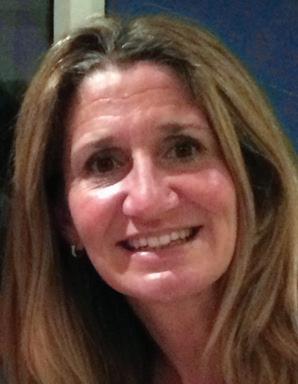
- Lawcare asks legal community to ‘Tell Ten’ for World Mental Health Day 10th October 2022
- Dye & Durham’s BuildX Solution Improves Operational Efficiency for Fidler & Pepper
- Family relationship DNA testing as we emerge from a period of darkness…
- Experts - a miscellany
- An Introduction to Finders International
And just like that it was Autumn and almost Halloween and the shops have already put out their Christmas displays ! The children have not only gone back to school they are breaking up for a half term holiday
Due to the time lag in between the Bulletin being put together and coming out to you the events in this edition are from the Summer which is traditionally a quiet time for the Law Society. However, Autumn is proving to be a very busy time and there is lots happening with DDLS so please check out the website www.derbylaw.net which I am trying to keep up to date with all the goings on.
EditorialPlease also find DDLS on LinkedIn and follow us. If any firms have press releases etc they would like me to share on social media and also get into the Bulletin please let me have them. Likewise, I try to pass on any job vacancies that I see but again feel free to send them through to me.
The Family Law Update from No 36 Chambers was a huge success and there will be a similar update course for our criminal lawyers in the Spring. Any other requests for courses please let me know. There are various providers out there who get in touch with me but I need help in choosing which courses the local profession would benefit from.
The Derby City Schools Debate Competition has launched and there are 9 schools and 13
teams entered so far. So hopefully another successful event and more straightforward logistically than the previous covid years –famous last words !!
If anyone would like to contribute to the President’s charity there is a just giving page https://www.justgiving.com/ crowdfunding/derbyanddistrictlawsocietyderbyanddistrictlawsociety?utm_ term=JVe637vnb
Any ideas for fund raising events gratefully received.
Take care.
Julia Saunders admin@derbylaw.net 01283 734989
President* Manesha Ruparel Alexander & Co Tel: (01332) 600005 mr@aandco.co.uk
Vice-President* Oliver Maxwell Nelsons 01332 378696 oliver.maxwell@nelsonslaw.co.uk
Immediate Past President*
Julie Skill, Elliot Mather LLP Chesterfield Tel: 01246 231288; julie.skill@elliotmather.co.uk
Deputy Vice-President* Tina Attenborough Attenborough Law, Derby Tel: 01332 558508 tina@attenboroughlaw.co.uk
Fiona Apthorpe Geldards LLP, Derby Tel: 01332 378335 Fiona.Apthorpe@geldards.com
Parliamentary Liaison Officer
Julie Skill, Elliot Mather LLP Chesterfield Tel: 01246 231288 julie.skill@elliotmather.co.uk
Public Relations Officer (+)
Vacant
Derby Junior Lawyers Natasha Hybner Swindell & Pearson 01332 367051 natashahybner@patents.co.uk
Constituency Council
Representative, Derbyshire (+) Shama Gupta shama.gupta@freeths.co.uk
Andy Cash Cartwrigt King, Derby Tel: 01332 346111 andy.cash@ cartwrightking.co.uk
Andrew Cochrane Flint Bishop, Derby Tel: 01332 340211 Via nikki.rennie@flintbishop.co.uk
Diana Copestake Freeth Cartwright LLP Tel: 0845 2725674 diana.copestake@freeths.co.uk
David Hardy Tel: 01332 842008 david.hardy1630@gmail.com
Natalie Haydon-Yeung Geldards LLP 01332 331631 natalie.yeung@geldards.com
Martin Salt martinsalt@johnmlewis.co.uk Tel: 01773 540480
Lucy Tissington lucy.tissington@familylawgroup. co.uk
Della Copley Della.copley@geldards.com
Sue Jennings Tel: (M) 07946 609436 robskelding@squarise.co.uk
Treasurer* Ben Lawson Elliot Mather LLP Tel: 01246 231288 ben.lawson@elliotmather.co.uk
Claire Rudkin Flint Bishop, Derby Tel: 01332 340211 claire.rudkin@flintbishop.co.uk
Simon Stevens Eddowes Waldron 01332 348484 sws@ewlaw.co.uk
Solicitors’ Benevolent Assoc. area representative Peter Lord 9 Larkhill, Swanwick DE55 1DD Tel: 01773 541753
Administrator / Bulletin Editor
Julia Saunders, 14 Risborrow Close, Etwall, Derby DE65 6HY Tel: 01283 734989 Mobile: 07964 358042 Email: admin@derbylaw.net
Quentin Robbins
Andrew Oldroyd (01332 225225)
Nick Wright (01332 364751)
Education & Training SueJennings, & all Sub-Committee Secretaries
Employment and Business Law SueJennings
Family Law FionaApthorpe
David Guthrie dg@aflp.co.uk
Diana Copestake diana.copestake@freeths.co.uk
Fiona Apthorpe Fiona.Apthorpe@geldards.com
Fiona Lazenby fiona.lazenby@knightsplc.com
Julie Skill Julie.Skill@elliotmather.co.uk
Lucy.Tissington@elliotmather. co.uk
Manesha Ruparel mr@aandco.co.uk
Natalie.Haydon-Yeung@geldards. com
Nick Herbert nh@aflp.co.uk
Ruth Jones ruth.jones@smithpartnership. co.uk
Sole Practitioners’ Group (SPG) TinaAttenborough
Kirpal Bidmead kirpal.bidmead@flintbishop.co.uk
Liz Guyler lizguyler@eglegal.co.uk
Lastupdated10.10.22
Engagements this month and next
I had the pleasure of attending the Northamptonshire Law Society annual Dinner on 23 September 2022. It was wonderful to spend time with the Presidents and Vice Presidents of the Nottinghamshire Law Society, Leicestershire Law Society, Birmingham Law Society, Hertfordshire Law Society and the welcoming hosts Northamptonshire Law Society. The event provided a great platform for delegates to network and re-connect in a social setting, further strengthening our ties and forming new partnerships with societies in the region and beyond. It was particularly refreshing to experience the positive energy for progression.
I am excited to announce the launch of the Diversity, Equality and Inclusion SubCommittee – at 12 noon on 13 October 2022 at University of Derby, One Friar Gate Square, Agard Street, Derby DE1. The launch will take place in conjunction with a networking event on Social Mobility and Diversity, which has been organised in collaboration with the University of Derby Law Society. There is an exciting panel including Hasnat Bashir of St Ives Chambers, Ashiedu Joel a Cultural Intelligence Facilitator and Trainer and Vee Munro, barrister and former lecturer at the University of Derby. This event is not one to be missed, I look forward to seeing you there!
I begin this article by remembering her Majesty Queen Elizabeth II who sadly passed on 8 September 2022 aged 96. Her Majesty was the UK’s longest-serving monarch, taking the throne at 25 years of age on 6th February 1952.
Unlike traditional leaders who resist change, Her Majesty displayed a love to embrace change and adapt according to the changing times. When she ascended the throne, she changed the original decision of broadcasting the coronation ceremony on radio to television. A first of many changes to modernise the monarchy over time. Her Majesty’s reign of 70 years is a testament to her dedication, resilience and strength, a truly remarkable lady.
I was saddened to hear about the passing of John Waldron of Eddowes Waldron who passed away on 21 August 2022 aged 71 years. John was very well thought of in the area. Sincere condolences are sent to John’s family and friends, John will be missed.
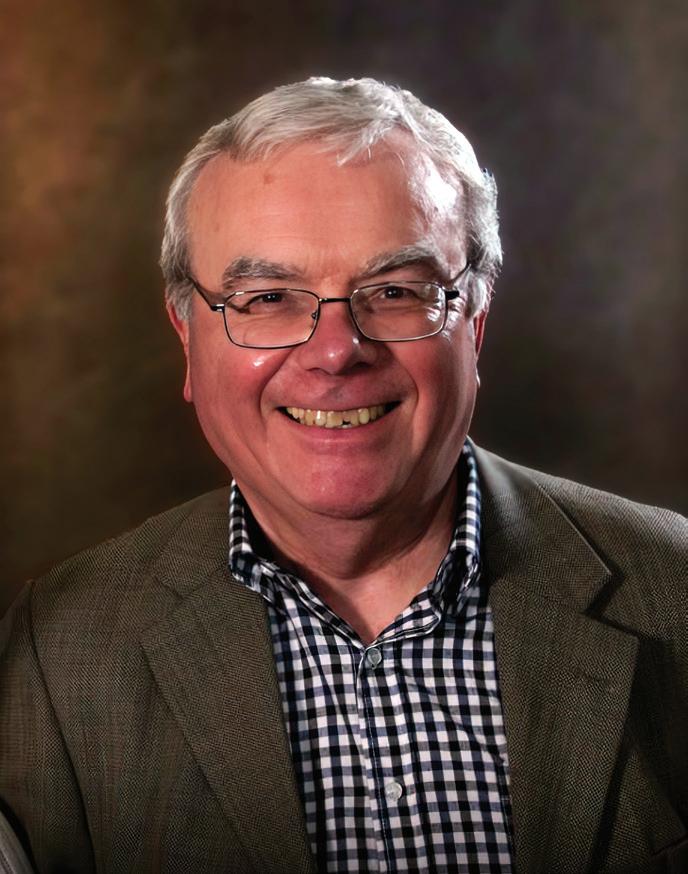
Our society arranged a Family Law Update on 20 September 2022 which was presented by 36 Family Chambers and hosted at Nelsons Solicitors. The update was very well attended and we received positive feedback for the update. If there are any particular updates or seminars that you would like to see in the future, please contact Julia on admin@ derbylaw.net
In support of one of many aims this year, an event was set up to help members achieve a ‘work/life brilliance’ on 28 September 2022 which was presented by Sarah Markham (founder of Calm in a Box) and again, kindly hosted by Nelsons Solicitors. I was lucky to be able to attend the workshop; it was insightful and enabled those attending to refocus on their mental health. Many did not know what to expect when they attended, it appeared that everybody came away with a lot of ‘food for thought’ in taking small steps to achieve a more positive work/life brilliance!
I am not sure whether you are fans of the Great British Bake Off or ‘sampling’ some sweet treats or bakes! Or alternatively to support a good cause – if so, there is a fantastic opportunity to take part in the DDLS Bake Off on 5 October 2022. There are wonderful prizes for the top 3 bakes and all proceeds will go to our charity of the year Derbyshire Mind. Thank you to fellow committee members Lucy Tissington and Chloe Summers for organising this event.
I am honoured to be invited by Mike Copestake; the High Sheriff, to the Derby Legal Service which is to take place on 9 October 2022. I look forward to reporting back to you on this event in the next bulletin.
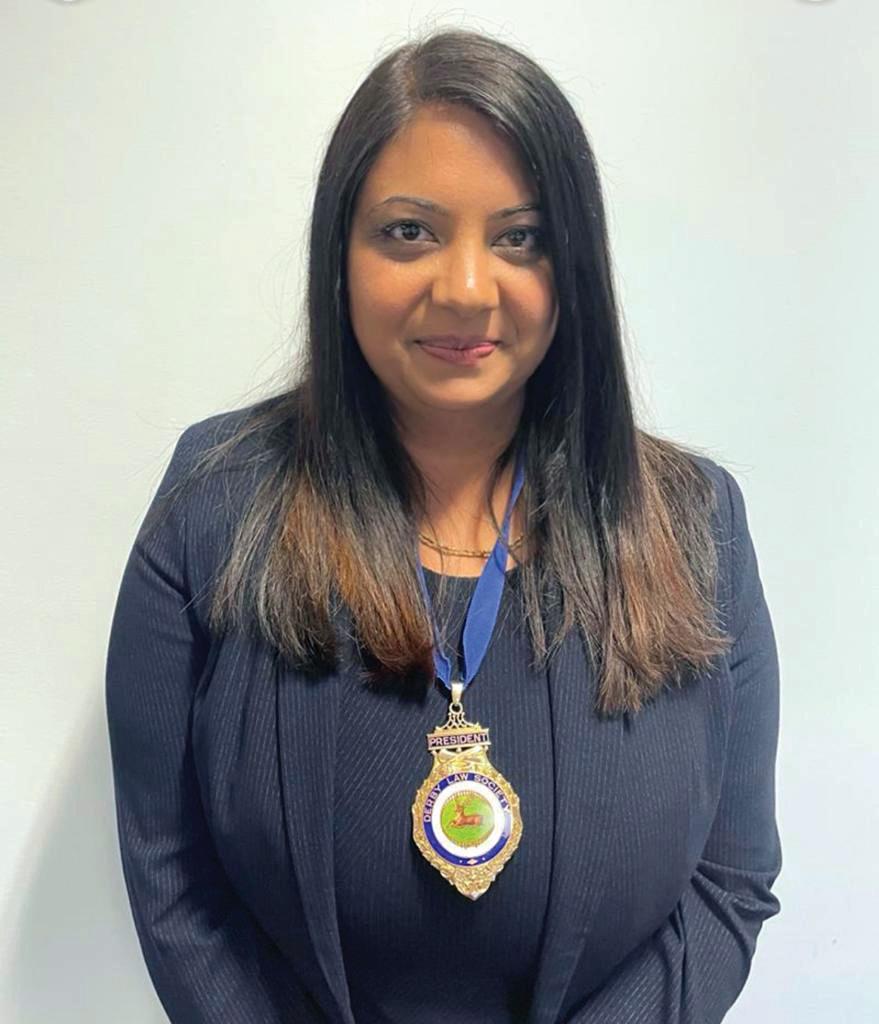
On 17 October 2022, I will be representing our society at a dinner with the SRA. Thank you to those that have already raised matters that you wish for me to discuss or their behalf. If there are any particular views or thoughts that you wish for me to express, please let me or Julia know.
We have a Ghost Crawl taking place in November and a Christmas Social & Networking event in December, look out for further information in due course, they look to be great events.
I am pleased to note that Derby Junior Lawyers is now well and fully formed. If your junior lawyers are not yet members, I would certainly recommend that you encourage them to join, the benefits in joining this society are immeasurable. The networking, peer support and fun are some to mention. Well done to those re-igniting this society.
At lot of work happens behind the scenes in arranging events – particularly by our administrator Julia Saunders but also by many others. I wish to express gratitude to all those involved. I have a special thank you to Laura Matthews who has been involved in creating the publicity branding for our society – Laura certainly has a creative eye; her efforts are much appreciated.
If you would like to get involved in the Committee or if there is anything that you would like to see our society to do more of –please do not hesitate to get in touch.
That is enough from me, I look forward to seeing you soon!
Manesha Ruparel President, 2022-23
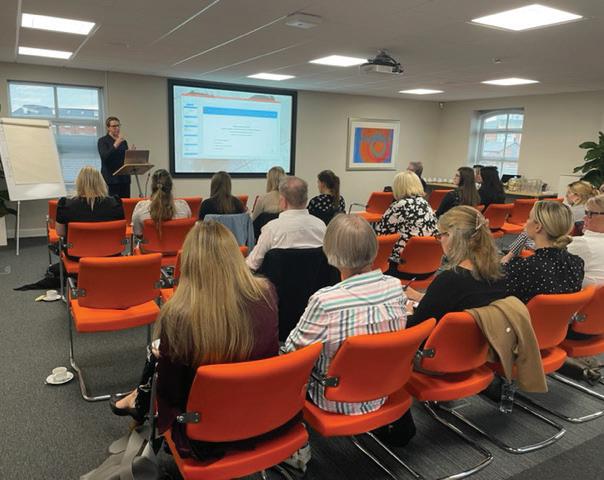
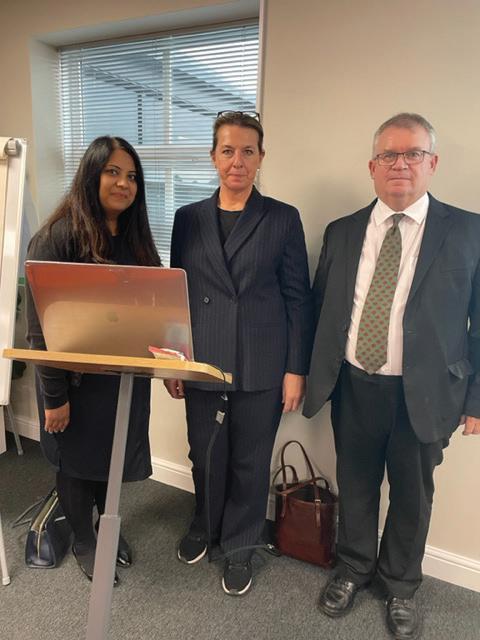
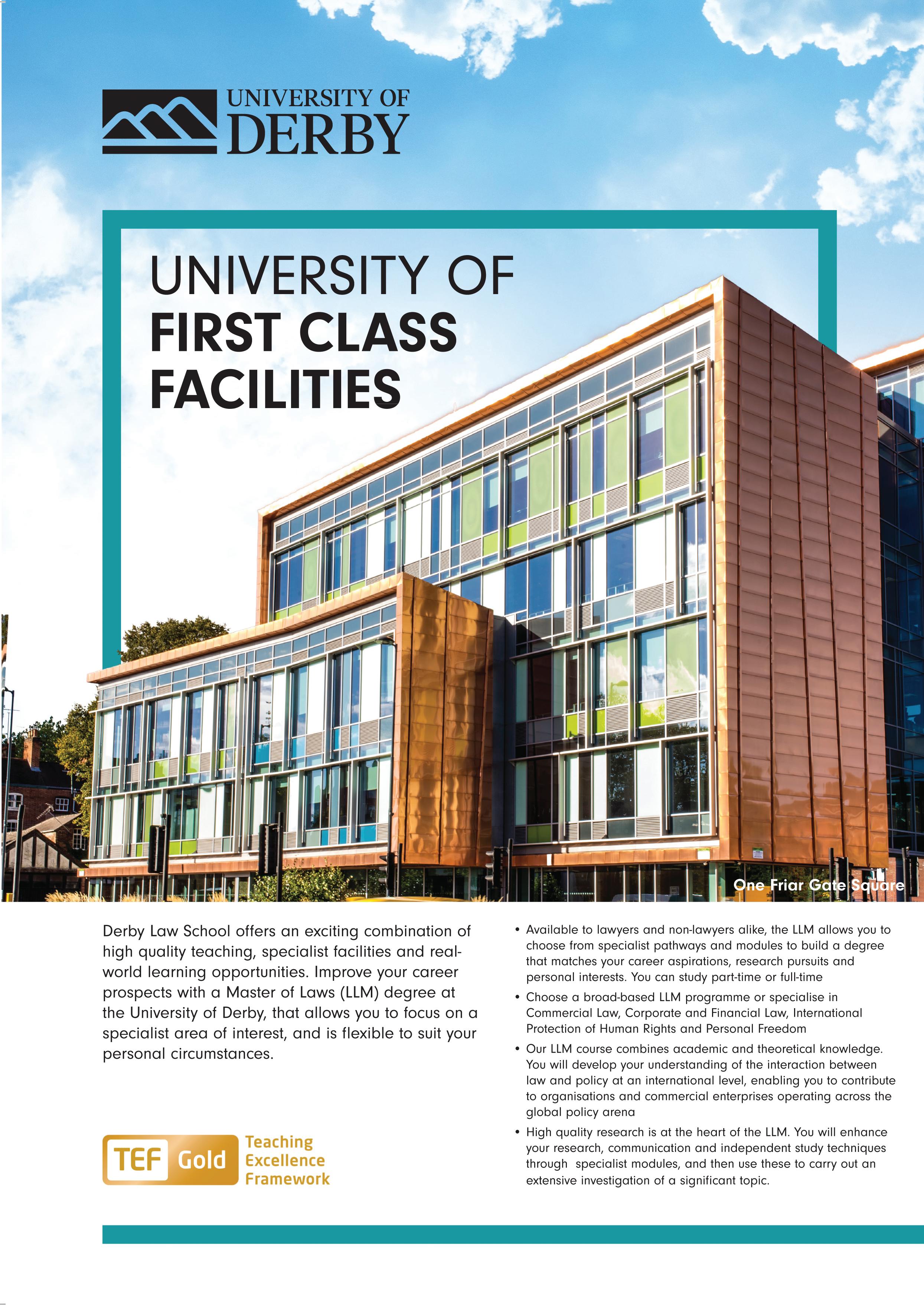
Even if they are not criminal practitioners my readers will have heard of the Police Station Duty Solicitor Scheme (the D.S.S), the purpose of which is to give persons arrested and in custody access to legal advice at the time of interrogation. However, while widely known, few will be familiar with the circumstances of its “birth”. Although, not the midwife, I was around when, mewling and pukeing it entered upon the world. For me, the circumstances ended an era of professional innocence.
Before the D S S entered my life as a criminal lawyer I had naively believed that developments in legal procedures, especially those connected with the liberty of the subject resulted from long consultation within the Law Commission or careful informed debate among the lawmakers in Parliament. I learned, through the D S S that, on the contrary, most such developments are conceived in short term political expediency and from birth are infected with a virus called “the law of unintended consequences”. Although the provision of free legal advice in the police station might seem a magnanimous gesture by Government, it was conceived entirely by political expediency.
Notice of the birth of the D S S can be found in Section 59 of the now infamous Police and Criminal Evidence Act (P..A.C.E) 1984. It followed a long period of gestation. P.A.C.E was introduced by the Conservative Government initially as a Bill in 1982 to make sweeping changes to police procedures in the light of a number of high profile miscarriages of justice and racial tension arising from stop and search. However, as is not unusual with Bills before Parliament, the Government tried to use the generally reformative proposals in the Bill as an opportunity to introduce provisions having a contrary intention – in particular, on this occasion to significantly extend the period of time that an arrested person might be detained without charge, but under interrogation. A motive behind this was to enable IRA suspects to be subject to the extended detention (this being at the height of “The Troubles”), but, presumably, to avoid criticism that these suspects were
being “singled out”, it was made of general application ( i.e. to all arrested persons). This “device” did not escape the notice of the formidable shadow Home Secretary, Gerald Kaufmann and Gerry Bermingham M.P. for St Helens (a name which will bring back memories, for good or ill among older readers), and equally formidable retired Law Lords in the Upper House. As a result the Home Secretary, Leon Brittan, came under heavy fire for what was seen as a retrograde and unnecessarily oppressive provision .
Skilfully backed into a corner by the opposition, on the second reading of the Bill on November 7th 1983 Leon Brittan announced that the Government would amend the Bill to provide that a scheme would be introduced for those in custody, after arrest but before charge, to have free, publicly funded legal advice from either a solicitor of their own choice, or an independent local solicitor called from a rota, i.e a duty solicitor scheme. The responsibility for organising the national D.S.S was, unsurprisingly, passed by the Government to the Law Society which was told that the Scheme should be up and running by January 1st 1986 when P.A.C.E came into effect.
However, for “the usual reasons” all did not proceed well. In the Parliamentary debate in November 1983, Brittan had said “The Government recognise that strengthening a suspects rights in this way will place an extra demand on resources. We have made provision for this……we are putting our money where our mouth is”. However this grandiose gesture fell well short of the funding a workable scheme. The “money” of which Brittan spoke (and to which the Treasury had, no doubt reluctantly agreed) was £3 million. It soon became apparent that this figure was manifestly inadequate and the inauguration of the Scheme stalled. The Law Society made it clear that, within that budget, it would be impossible to find a sufficient number of solicitors to man a Scheme throughout England and Wales. It was not until the autumn of 1985 that the Lord Chancellor was able to announce that the “money in the mouth” would be £20 million,that being the minimum the Law Society felt necessary for a viable nationwide Scheme.
That delay meant that the L.S had approximately 3 months to get a Scheme upand –running, and was when I first became
involved locally. The years of wrangling over the budget for the national scheme showed that those within the Home Office and L.C.D responsible for “devising” the Scheme had almost no understanding of its practicalities “on the ground”. It also turned out that they had no concept of geography outside the M25.
Because I had been involved in some Legal Aid Committees, I was asked to join “likeminded” colleagues on the quickly formed East Midlands Regional Duty Solicitor Committee to establish and, for a time, manage D.S.S. in Derbyshire, Leicestershire, Nottinghamshire and Lincolnshire. Organising schemes throughout the first three counties was trouble free and we were “good to Go” by the end of 1985. The problem was Lincolnshire. We had contacted all the firms in that county and had been told that all the police stations in the county had been covered by the scheme. We told “the powers that be” in London. They came back to say that, from the list of police stations which we had sent only 60% of the county’s police station were covered, We contacted the Lincolnshire solicitors who assured us that all police stations were covered. Again, London said that they were not. Eventually we asked London for a list of the stations not covered. They sent us a list of the police houses in the Lincolnshire Fens and Wolds which it turned out were, statutorily, “police stations” although almost all had not detained anyone for decades. We accordingly asked the Lincolnshire solicitors to “divi” these up between them, which was duly done quickly and therefore honour satisfied until…… London asked why the solicitors on the Skegness scheme could not also cover Spalding, to minimize the expense. We pointed out, through gritted teeth, that they were over 50 miles apart.
It took about 3 years for the next example of the absence of London’s understanding of the practicality of the scheme “on the ground” to come out. The scheme provided for standby payments (if I recall £50 or£60 per 24 hours) for solicitors on the rota to be “on call” for each police station. At an audit of the Derbyshire schemes carried out in about 1990 it was found that the costs to the scheme of the detention of each “prisoner” at Matlock and Ashbourne police stations was approx. £3500. Some “rationalising mergers” of schemes immediately took place!!
John Calladine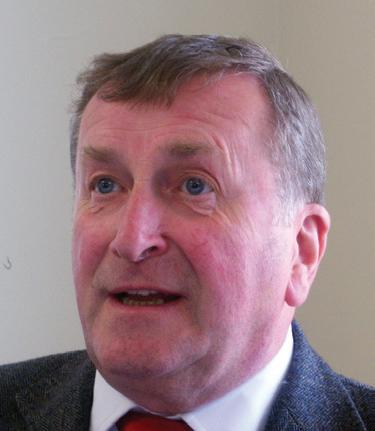

And so, the scene is set, a tranquil cricket pitch in Attenborough Village on a sunny summer’s evening on the 11th August 2022. Teams assembled from both sides of the A52 for the cricket match of the year... Nottinghamshire Law Society ‘v’ Derby & District Law Society
The coin toss.... Derby to open batting... Nottinghamshire to field... Let battle commence!
Jagdish Parwar and Alex Needham opened the
batting for Derby & District Law Society (DDLS), with Aaron Singh and Matt Slade bowling for Nottinghamshire Law Society (NLS).
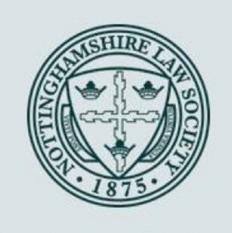
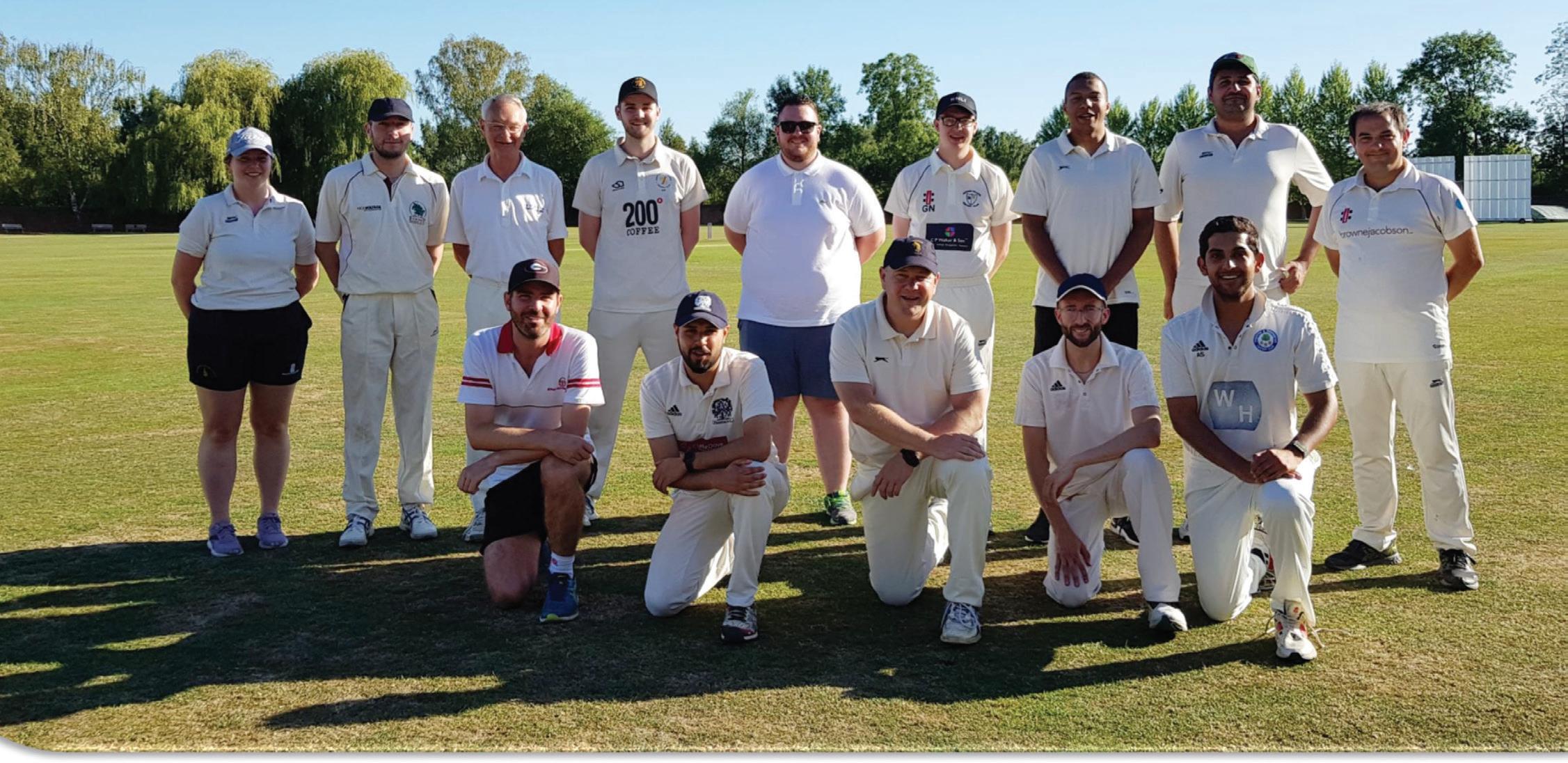
After some fantastic bowling, Matt finally bowled out Alex Needham, leading Nick Wright into bat for Derby next.
NLS then changed their bowling tactics bringing into Grant Benskin to bowl to Nick Wright, which was caught fantastically by Aaron Singh Hugh White was next into bat for DDLS.
The scores at this point of play for DDLS was 44 runs, 2 wickets and 9 overs!
At 10 overs we changed ends and beginning the batting for DDLS was Phil Bramall, team captain but, didn’t manage to stay in for very long being caught out at 55 runs, 3 wickets and 12 overs.
NLS bowling pairs were Billy Shaw and Ben Shellard, with John Ellis batting for DDLS but, not for long as Matt Slade fielding caught a brilliant hit perfectly – Ellis out!
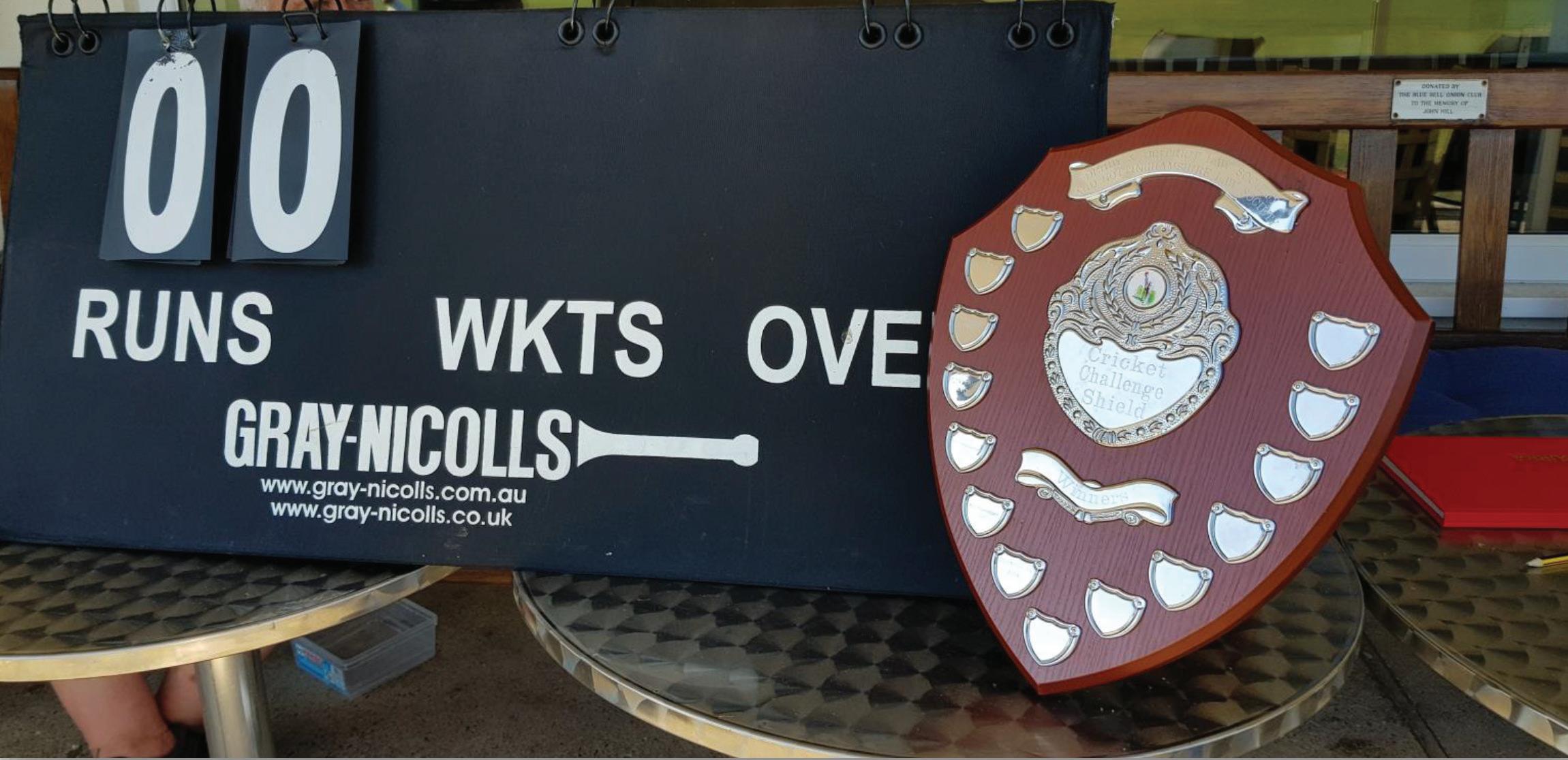
James Newton, next into bat and according to match scorer Dave Wykes, there were a lot of wides (who am I to know that information)!
Aaron Singh steps back into bowling paired with NLS Captain Kassra Powles , we are now at 73 runs, 5 wickets and 15 overs.
Longstanding DDLS batter Jagdish Parwar is finally caught out by an amazing catch from Matt Slade , after 21 runs!
Stepping up to bat next is our very own Joanne Derbyshire from NLS. Joanne was on loan to DDLS due to shortage of players and because her name was Derbyshire, we thought it would work.
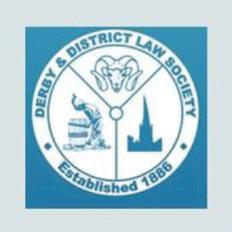
Joanne put on a great performance for the
DDLS team, she has a great batting skill and one NLS will be keeping hold off in future games for 2023.
Unfortunately, Joanne was quickly replaced by Graham Dean batting alongside James Newton.
Then it’s all over for DDLS at 89 runs, 8 wickets and 18 overs!
Martin Foulds. After approximately 20 minutes of play, NLS are at 31 runs for 1 wicket and 4 overs – not bad!
DDLS Captain Phil Bramall steps up to bowl his best against the Nottinghamshire team and it is at this point that Shoaib is caught out by Alex Needham at 42 runs, 2 wickets and 6 overs.
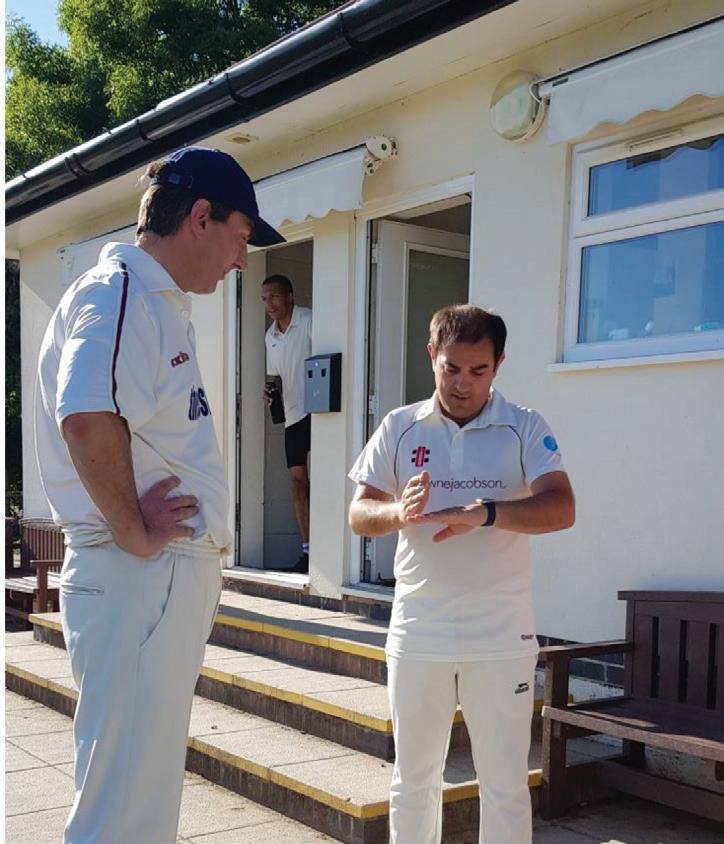
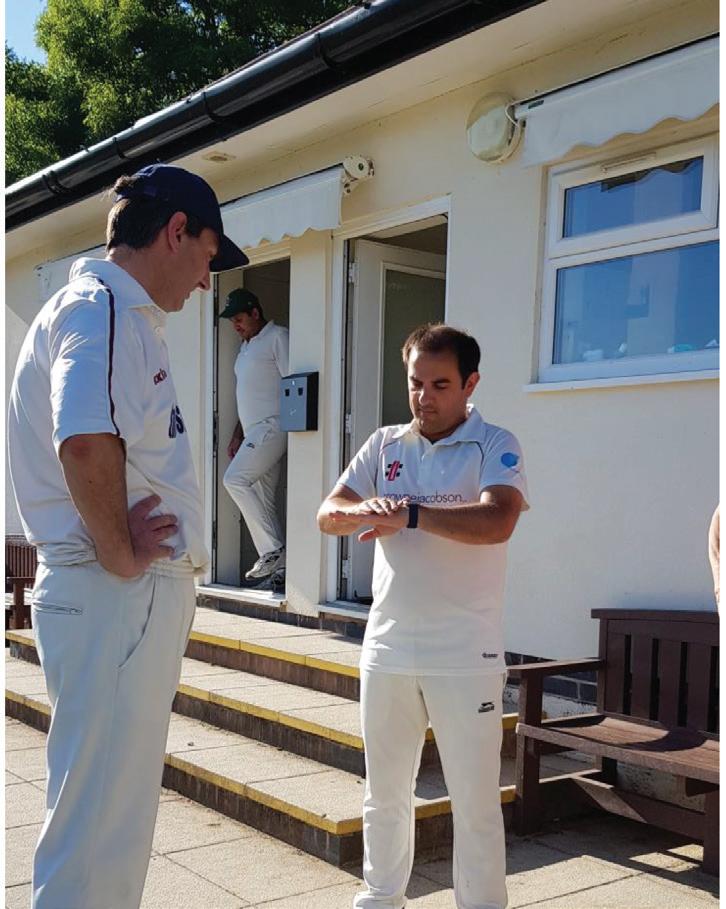
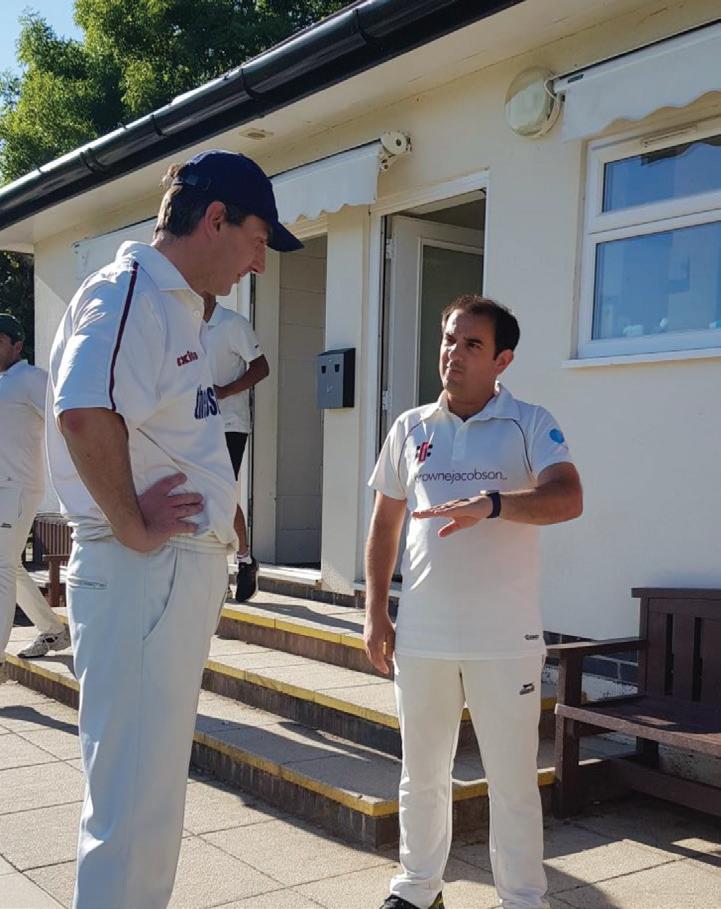
Aaron Singh comes into bat with Martin Foulds and this time it is Jagdish Parwar bowling for DDLS. At 7:45pm, NLS were at 59 runs, 2 wickets and 9 overs we were storming ahead!
From then it is a blur of fantastic batting,
Time for NLS to take to the bat beginning with Paul Hinchliffe and Shoaib Azad, with motivational words at the break from Head of Operations, Michelle Foster, “no pressure guys, let’s bring this trophy home” the guys went out there to show them what the battle of the A52 is all about.
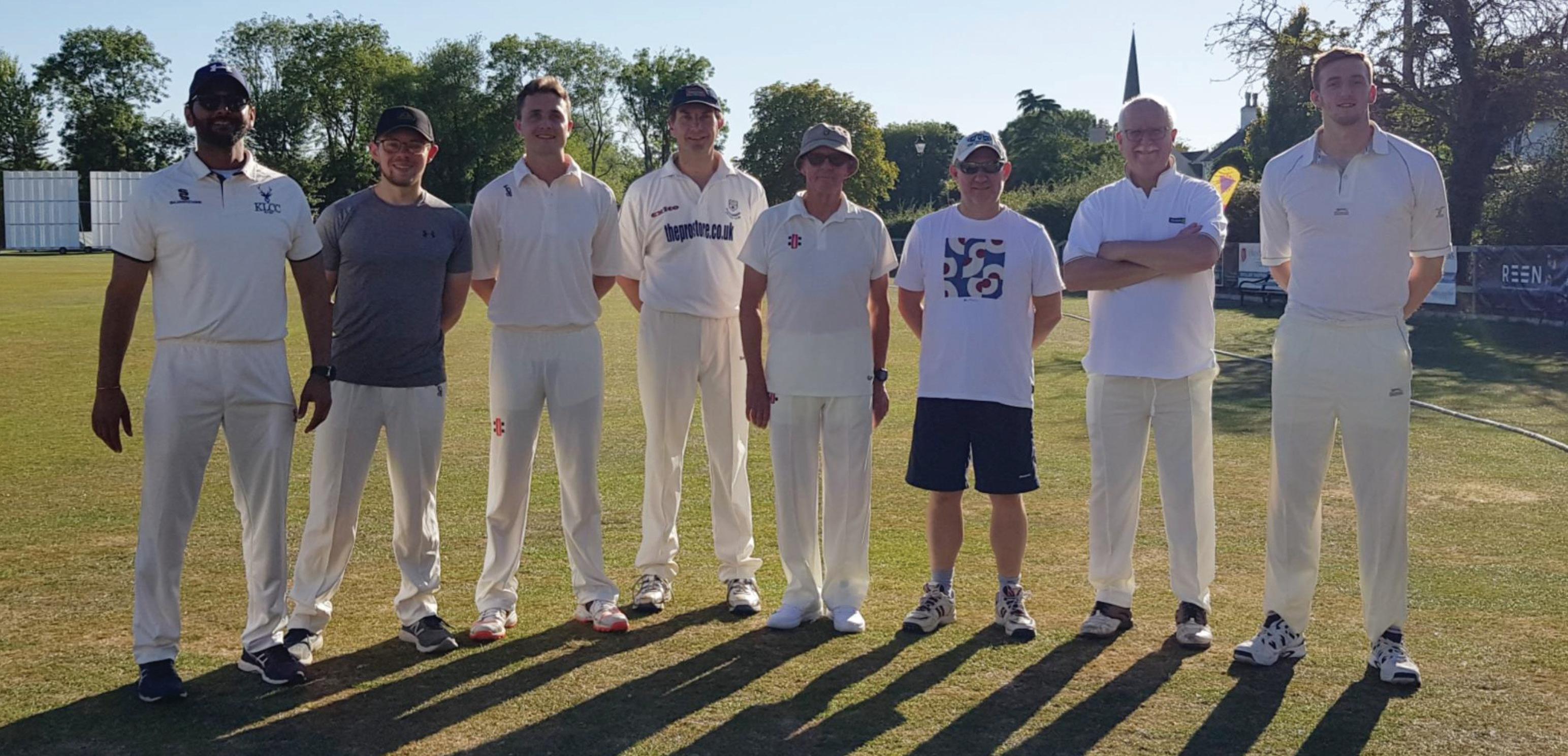
Alex Needham began the bowling for DDLS taking out Paul Hinchliffe at a wicket, next into bat was devoted NLS cricket player
runs and then Aaron is caught out. George Neville steps up for the team to bat against James Newton bowling.
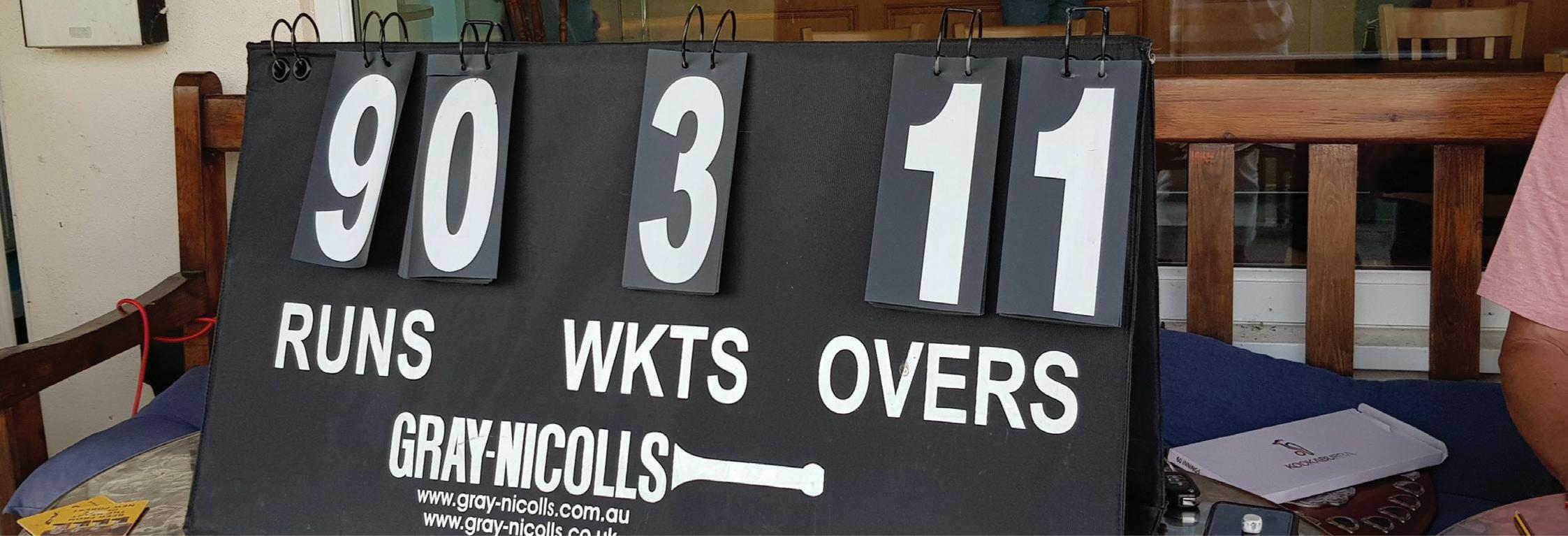
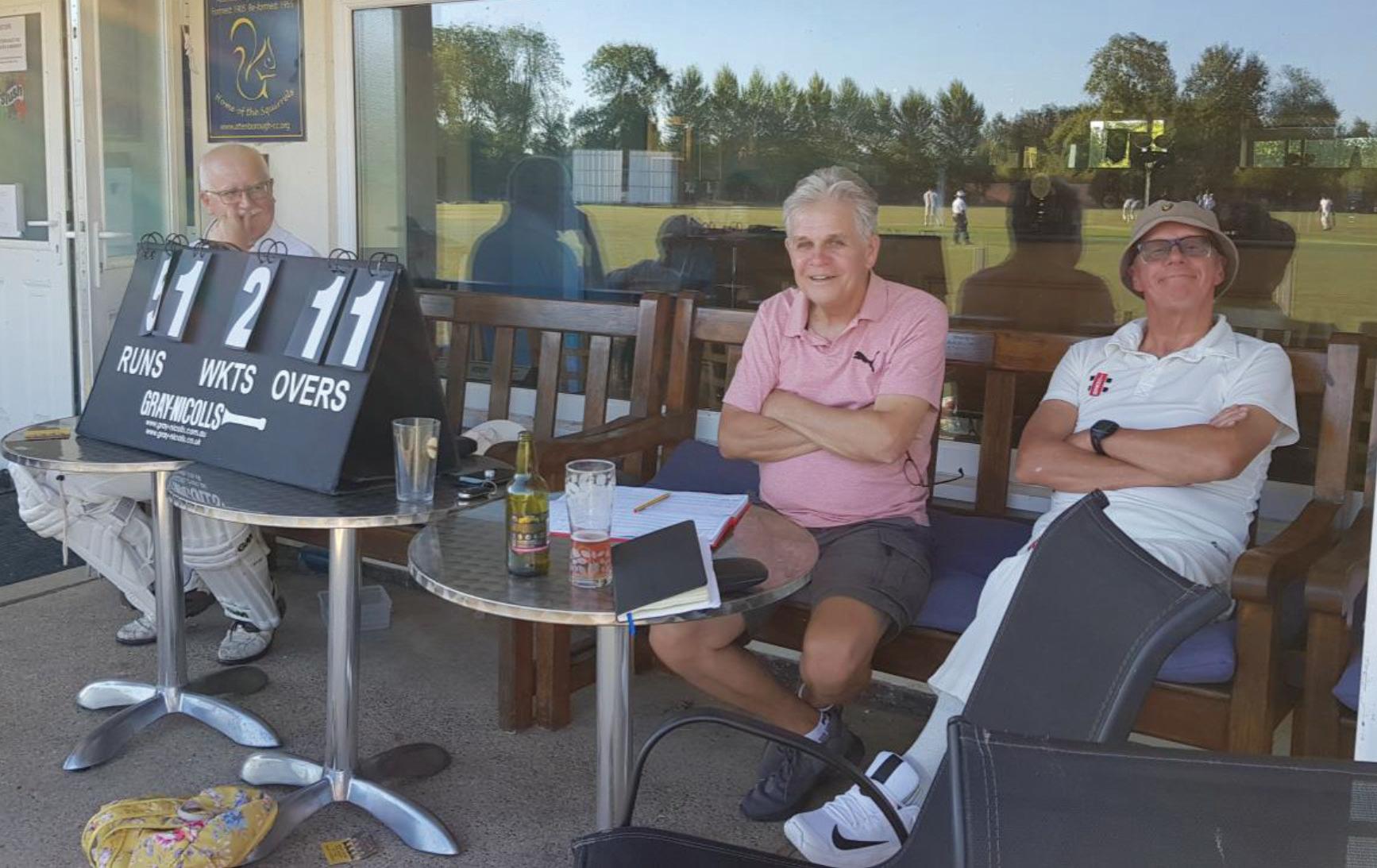
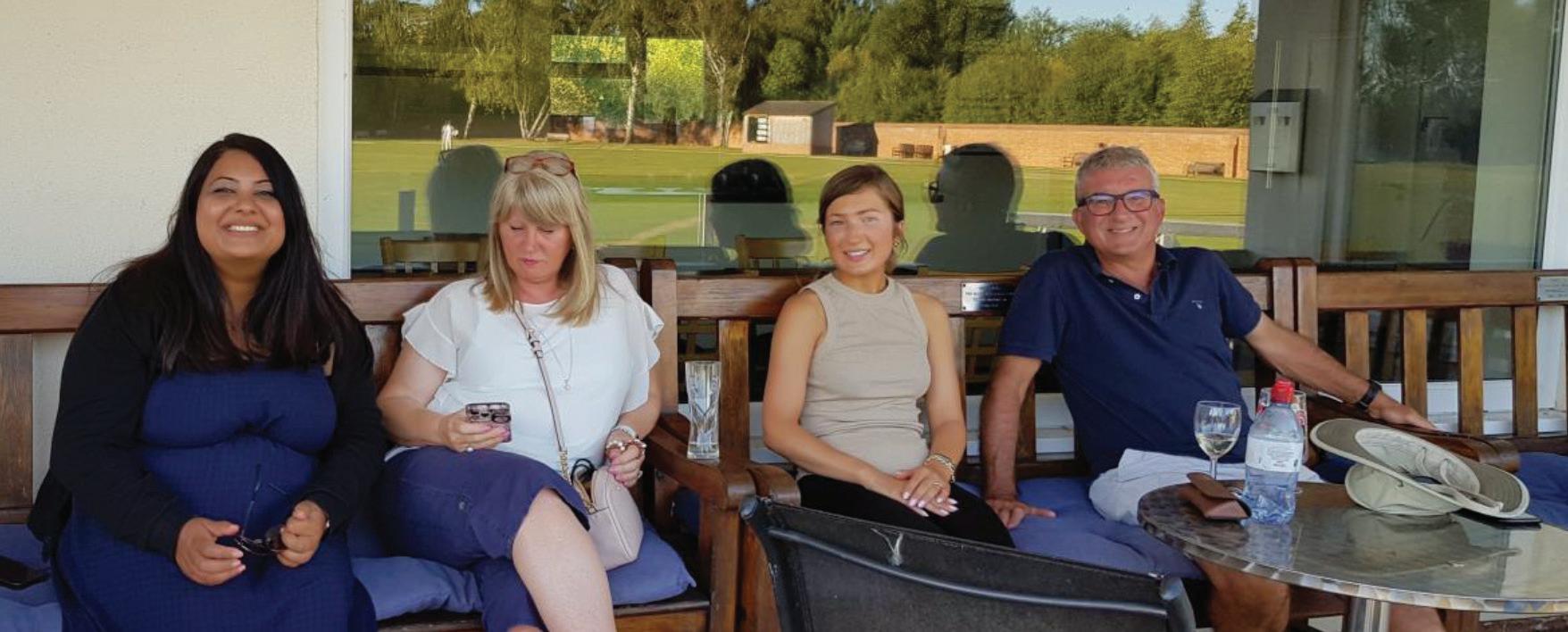
And at 7:58pm it is all over, 90 runs, 3 wickets and 11 overs – Nottinghamshire Law Society championed the Battle of the A52 again this year!
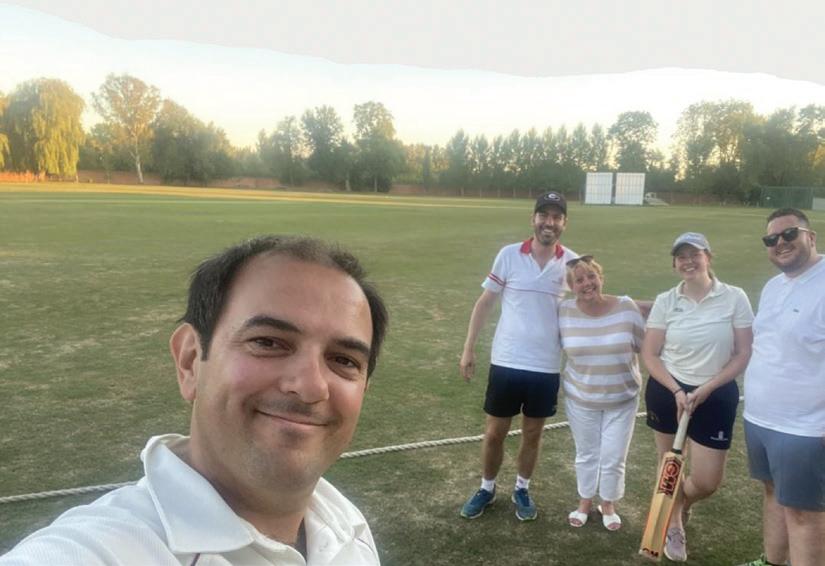
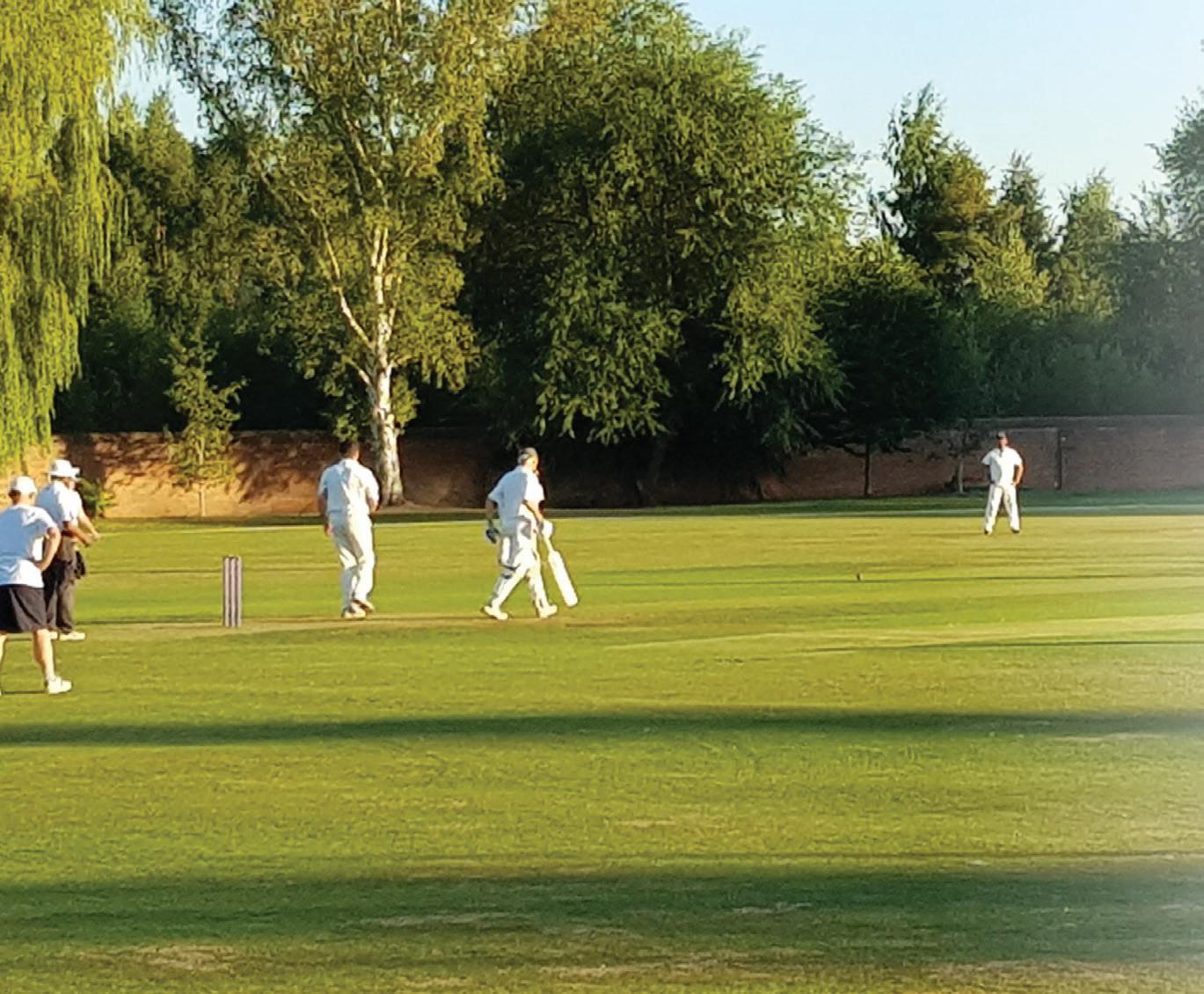
After a scrumptious cricket tea, the presentation of the trophy was made by
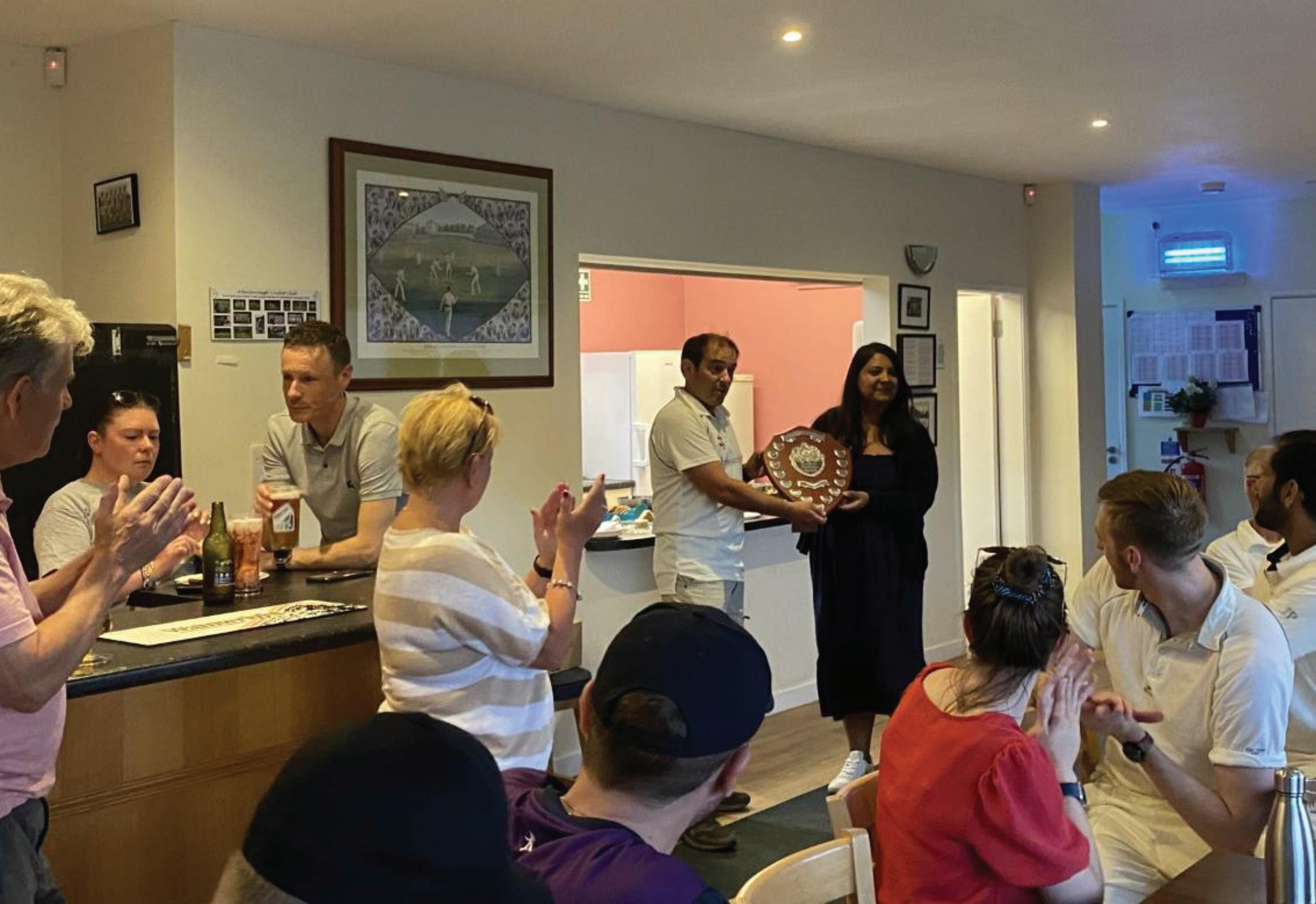
Derby & District Law Society President, Manesha Ruparel to NLS Captain Kassra Powles. (see below)

Thanks was given to Derby & District Law Society for hosting the game at Attenborough Cricket Club and to the supportive umpires
Until then, we will see you to defend the trophy next year...
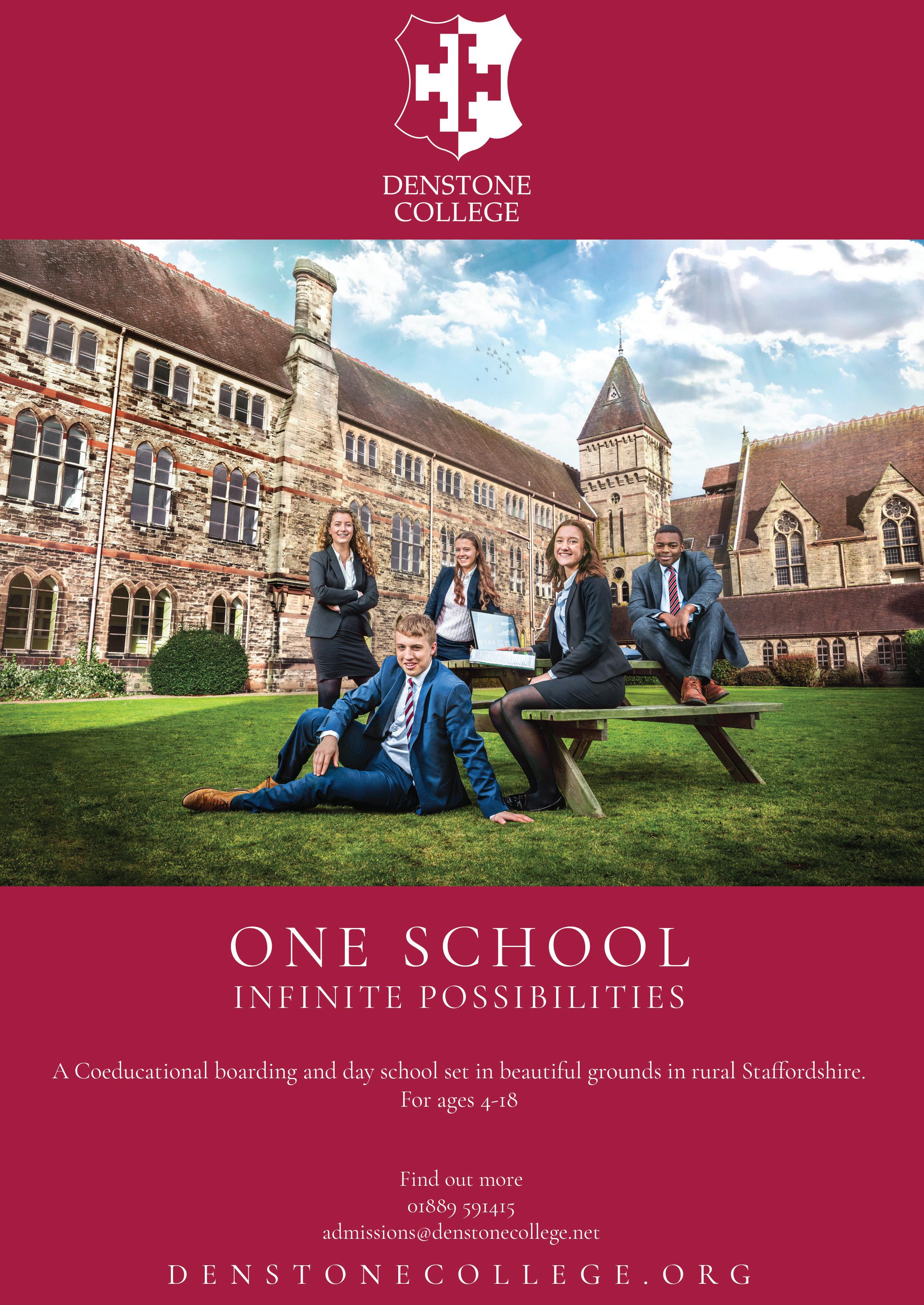

wishes for family and friends are met.
This news comes at the start of RememberACharity Week (5th –11th September 2022), the nation’s annual public awareness campaign for charitable gifts in Wills. It echoes recent research showing that more than 1 in 5 Wills handled by UK legal advisers (22%)2 now include a donation to charity.
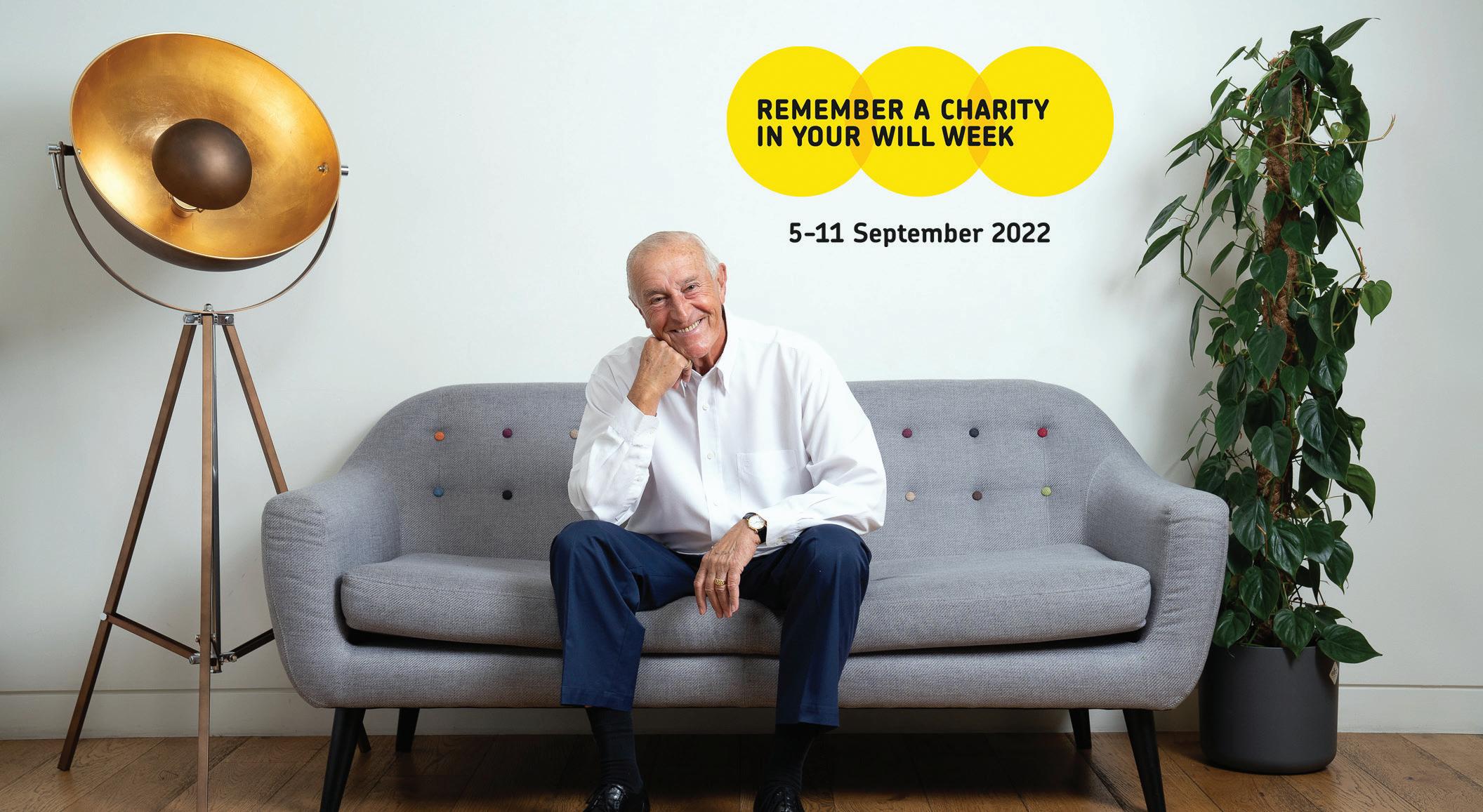

Birmingham, Portsmouth, Bournemouth and Exeter. Areas that have seen the most annual gains in charitable estates are Brighton, Kingston-upon Thames and Ipswich.
Will to charity can double the chances that a client will choose to do so. And those gifts really can be transformational for UK charities. Today, that income is more critical than ever.”
A record number of people in England and Wales are supporting charities with gifts in Wills. 10,6701 different charities received a gift from a Will last year and 37,242 charitable estates were identified – a 10.7% increase on the previous year. This reflects the growing appetite for legacy giving and the key role the legal sector plays in providing impartial information for clients about how to go about it, while ensuring that people’s
The public supports a wide spectrum of charitable causes, from researching treatment for cancer and dementia to supporting vulnerable children and adults, taking care of pets and animals, mental health support, rescue services and many others. Over a third (37%)3 of charitable Wills named just one charity, but more than one fifth (21.7%)4 contained two.
When it comes to location, the areas with the highest concentrations of charitable Wills in 2021 include Brighton,
Gifts in Wills are a critical source of funding for charitable services across the country, raising more than £3 billion for good causes annually. Generous tax reliefs make gifts in Wills one of the most efficient ways of donating. In the UK, charitable bequests are exempt from the 40% Inheritance Tax and, when clients donate 10% or more of the value of their estate, the IHT rate is reduced to 36%.
Lucinda Frostick, Director of RememberACharity – a consortium of 200 charities, says: “Legal advisers play a crucial role in helping the public understand all the options open to them when they write a Will. Our research shows that even the simplest of references to the option of leaving a gift in a
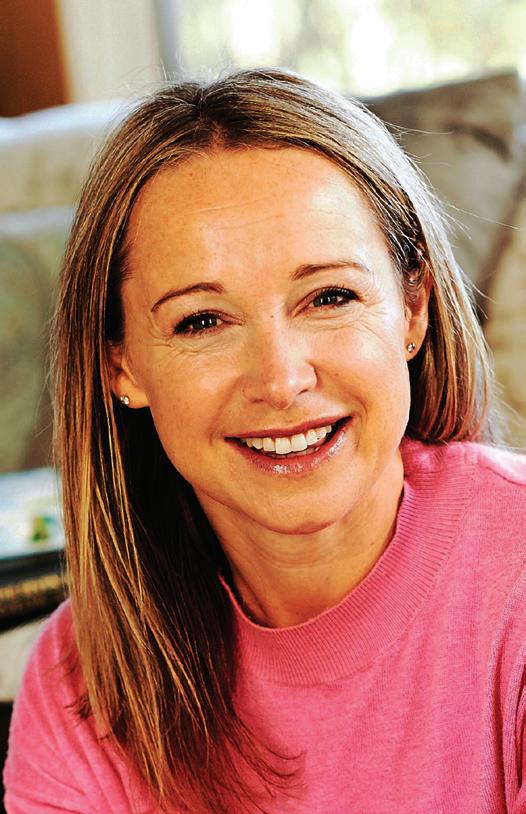
The consortium works all year round to normalise charitable Will-writing across the UK by raising awareness of legacy giving among legal professionals and the public.Through its free campaign Supporter scheme for solicitors and Will-writers, it offers promotional resources and useful guidance for referencing gifts in Wills with clients.
To find out more or join the existing network of campaign supporters, see:https://www. rememberacharity.org.uk/ advisers


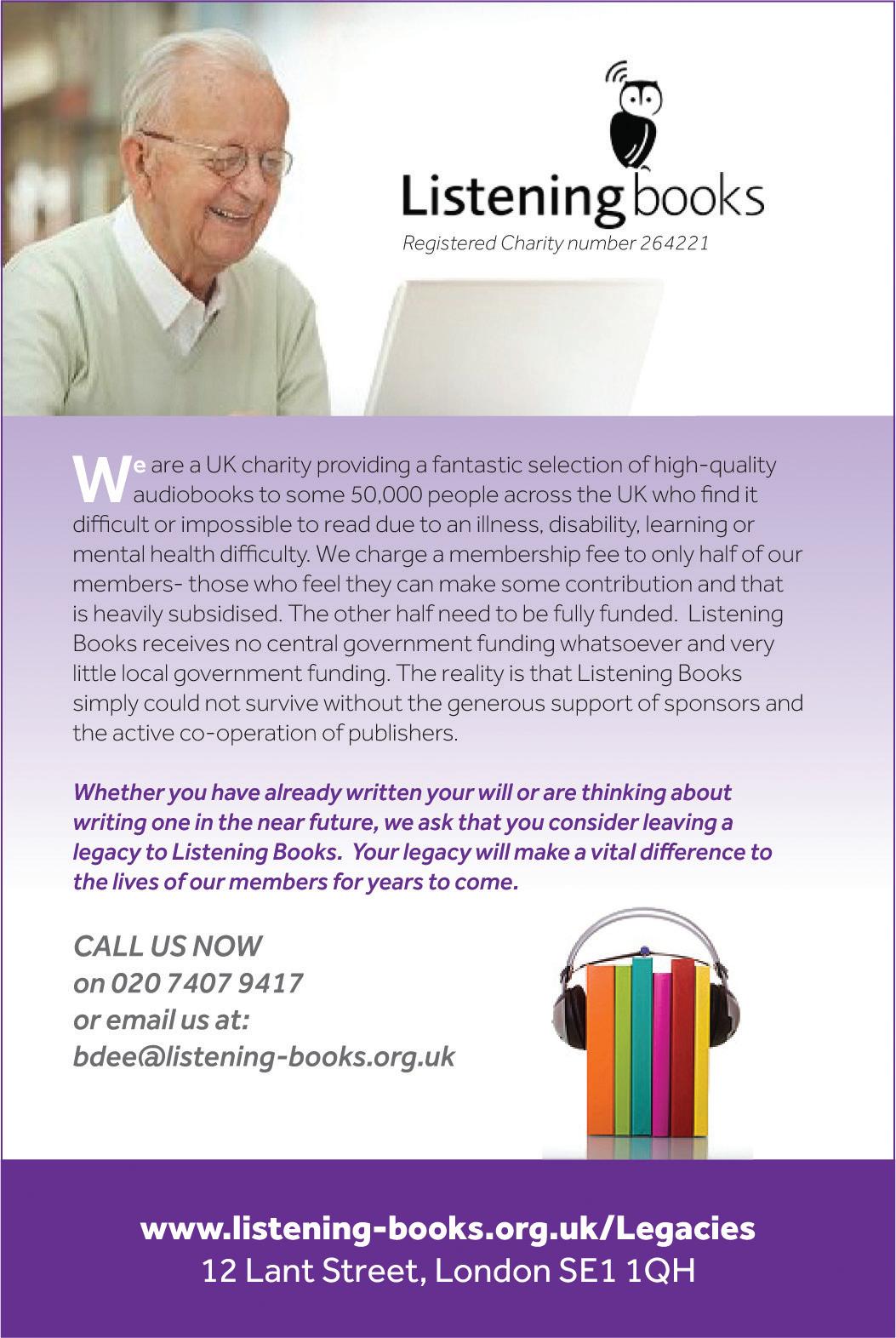
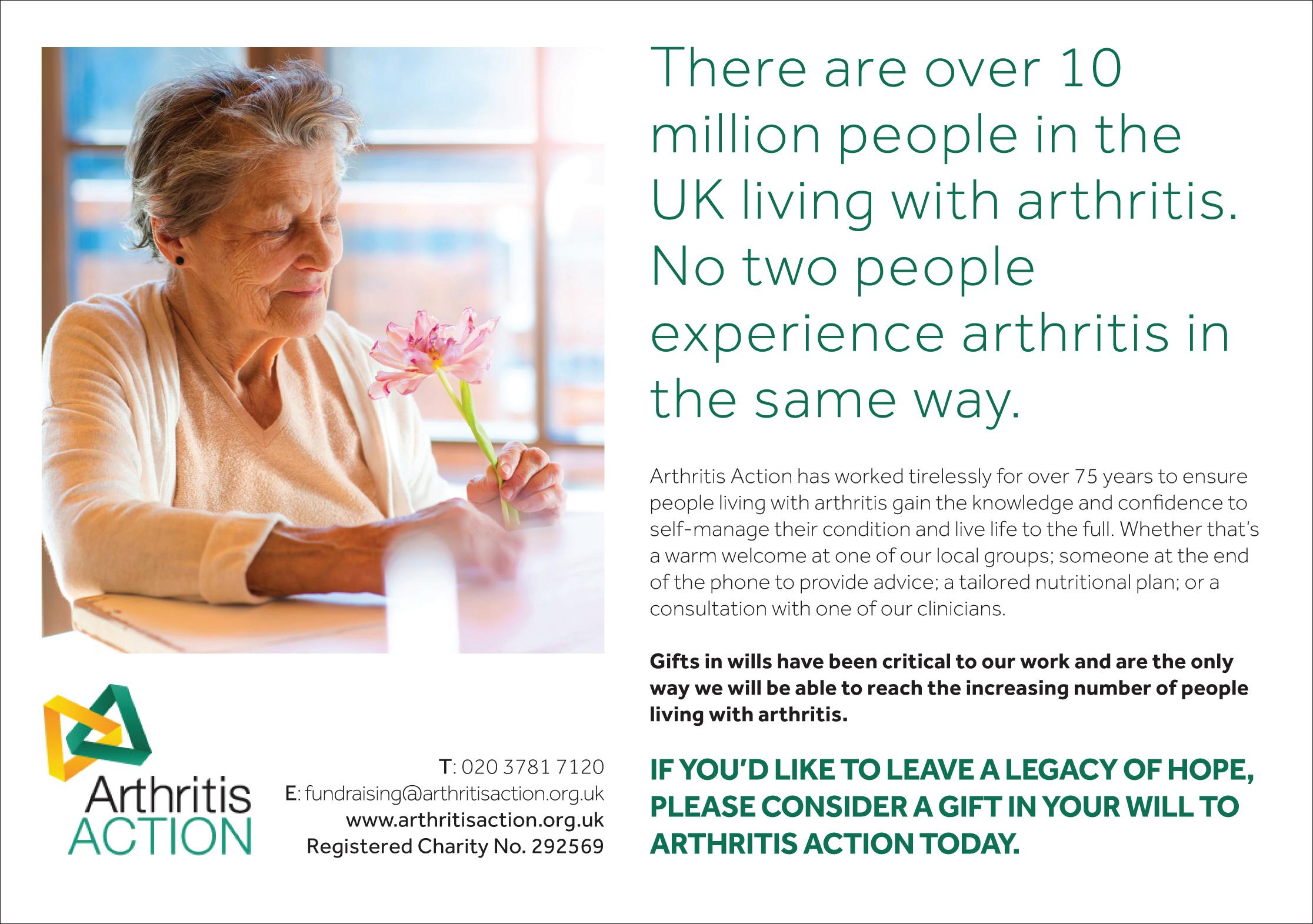
With charities across the country facing urgent funding needs and rising costs, national consortium Remember A Charity, is calling on legal advisers to make Willwriting clients aware of the option of leaving a charitable gift in their Will, after taking care of their loved ones.
Wills are a vital funding stream for charities and the consortium estimates that just a 4% increase in the proportion of people leaving a gift in this way could raise an extra £1 billion for good causes each year. Every day 100 people write a charity into their Will, and within the next decade alone, that income is expected to bring in over £40 billion, but there are still many people who are unaware they can leave a donation in this way.
Remember A Charity is on a mission to normalise charitable gifts in Wills, working with over 800 solicitors and Will-writers across the UK, who have signed up to its Campaign Supporter scheme. Earlier this

year, it found that one in five (22%) Wills handled by UK legal advisers now includes a charitable beneficiary.
Lucinda Frostick , Director of Remember A Charity, says: “Solicitors and Will-writers play a crucial role in building understanding around gifts in Wills among their client base. Even the simplest of references to the option of leaving a gift to charity from a client’s Will can double the chances that they will do so.
“For more and more people across the country, their Will is not just an opportunity to support loved ones, but a chance to leave a legacy. This income stream from gifts in Wills has never been more critical or valued.”

The appeal comes in the build-up to the consortium’s annual Remember A Charity Week (5th-11th September), which serves as a springboard to raise the topic of Willwriting with clients.
Will-writers and solicitors who join Remember A Charity’s Campaign Supporter Scheme are listed in the consortium’s online directory of legal advisers and are issued with a resource pack to help them open up conversations with clients about charitable Will-writing during and beyond Remember A Charity Week. This includes logos, social media images, web banners, information sheets, press releases, templates and much more.
Lucinda Frostick, adds: “Remember A Charity Week is a celebration of the huge impact of charitable bequests, ensuring that all clients are aware that they have the opportunity of leaving a gift in their Will, no matter how big or small.”
To find out more or join Remember A Charity’s Campaign Supporter Scheme go to https://www.rememberacharity.org.uk/ about-us/for-solicitors-will-writers/joinus/
As well as pinpointing the regions with the highest and lowest application volumes, the report draws on data that reveals:
• Planning application types
• Granted/refusal rates
• Approval rates for renewable energy projects
• Approval rates in flood zones
• Essential amenities per approved planning application
Piers Edgell , Landmark’s Client Director (Landmark Geodata) closes with a powerful argument for how planning data and the levelling up agenda are inextricably linked:
The last few tumultuous years for the UK housing market have highlighted one stark truth: housing supply is not meeting demand. Indeed, housing is one of the core pillars of the government’s levelling up agenda, underscoring the need to radically rethink the way new housing is planned and developed. Central to meeting this need will be the planning process itself.
It is the view of many that the current UK planning process is flawed, often cumbersome and a source of frustration for stakeholders across the entire spectrum, from developers to communities. Digitisation will undoubtedly play its part in transforming this process; the wealth of technologies now available (such as interactive geospatial technology, virtual simulations, and, of course, data) to inform and shape planning offer real opportunities for change. With this in mind, the halfway point of 2022 felt like a good time to step back and take a look at the data on planning applications over the past ten years.
In our newly released Data Insights Report: Planning Applications, we revisited the wealth of environmental, land and property data that we gather, manage and supply to the property industry on a daily basis, and analysed relevant datasets to provide a summary of planning trends between 2012 and 2021. Overall, we saw that, year on year, the rate of planning applications in the UK is increasing. In fact, in every region - except for London - the number of planning applications submitted per 100,000 people was at its highest in 2021, since 2012.
The report also features expert commentary from Landmark’s Chris Loaring , Managing Director (Landmark Legal), who shares his observations on planning trends beyond ‘the Covid effect’ and highlights the growing implications of the journey to net zero in future planning policy.

“We know that the built environment has a huge role to play in the wider net zero ambition and that new-build development is a major factor within that. Equally, we will watch with interest to see how the data evolves in regard to planning applications relating to existing housing stock and the retrofit options and upgrades many homeowners are now choosing to undertake
In the near future, I would hope to see a continuation - or even accelerationof environmental considerations in new build planning policies. Concepts such as renewable energy installations on housing developments of a certain size, for example, would be great to see. Meanwhile, new build developments could well pave the way for widespread progress in new policies for establishing electric car charging ports. This might seem, on the face of it, a small point but collectively, ease of access to electric charging points as a given would make a huge difference in easing the transition from fossil fuel based to electric transport options.”
“We have seen much debate and anticipation around the original Planning Bill, and now the Levelling Up and Regeneration Bill which supersedes it. In terms of the new proposed bill, it will be interesting to see how its content evolves during its passage through parliament, and precisely which elements are ultimately given final Royal Assent.
What is notable to me, when we consider the planning data in this report through the levelling up lens, is that planning is about so much more than simply where developments will or will not be built. Every planning decision impacts the immediate environment, and so planning data could and should become a critical tool for informing and shaping social policies that aim to improve – or level up – communities. What, for example, could the kinds of planning data shown in this report tell us, when mapped against data on increasing property values or household incomes? What could the data we have summarised on amenities within the vicinity of planning applications tell us about location-specific standards of living and local needs? From a big picture point of view, we might even wonder how this kind of data might correlate with health and wellbeing indices, mortality, employment and income figures. My hunch is that it would underscore that planning has the potential to alter communities and change life-chances, more broadly than its immediate impact on the built environment.”
You can access this insightful, timely and data-rich report at:
https://go.landmark.co.uk/planningapplications-insight-report
www.derbylaw.net

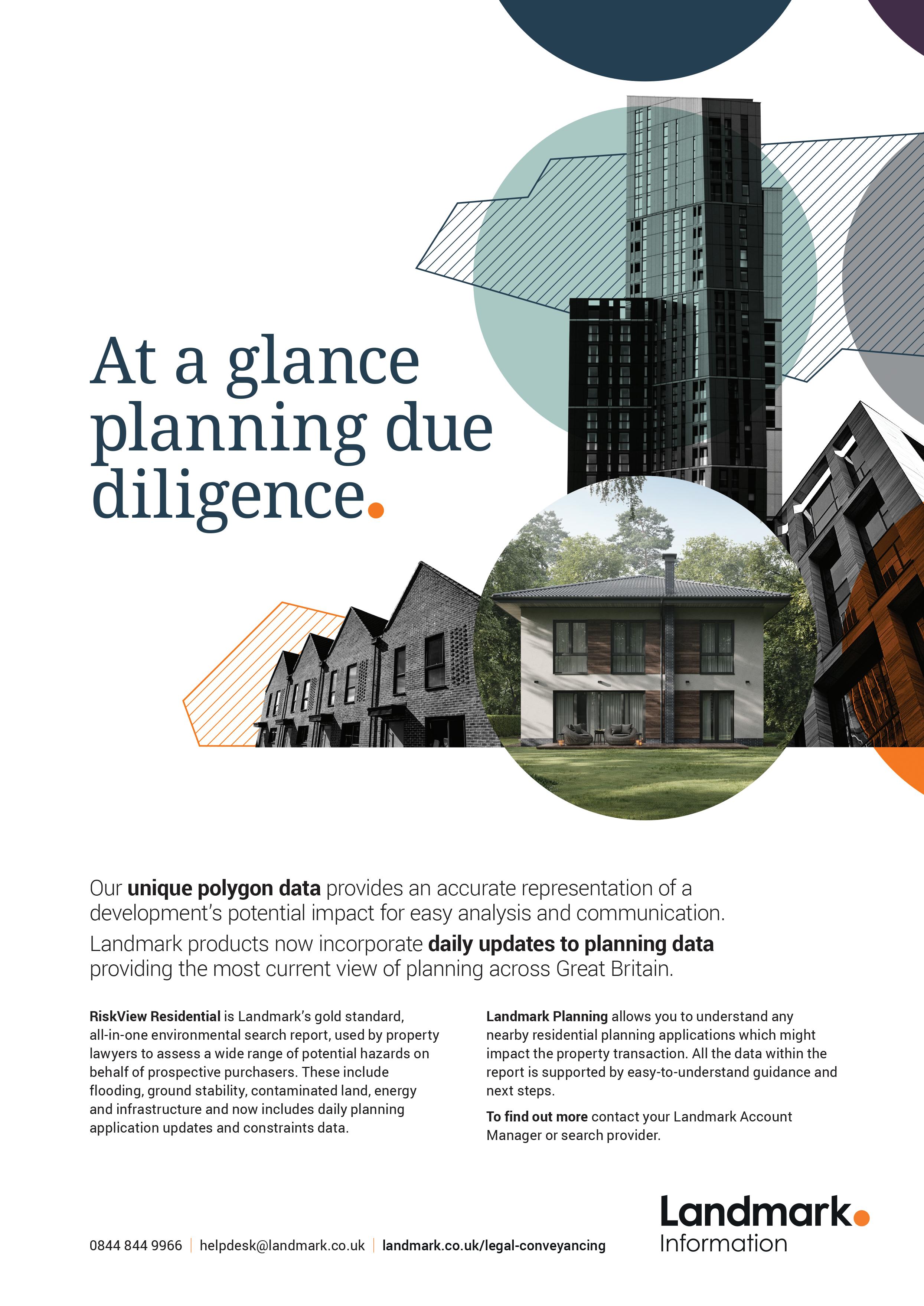
Winning friends and influencing people is all about understanding their situation and being empathetic to their challenges while excelling at service delivery
Personal relationships are still the heartbeat of business success, despite the increasing use of technology. Personal relationships convey how we value one another. Personal relationships enable us to have empathy with one another’s situations.
In his seminal book, “How to win friends and influence people,” Dale Carnegie wrote
“If there is any one secret of success, it lies in the ability to get the other person’s point of view and see things from that person’s angle as well as from your own .”
Business relationships then are as much about understanding the challenges we all face in our daily encounters.
The search industry has seen significant changes in recent years. Massive consolidation has seen so many of the traditional search companies swallowed up into larger corporates. We have to find ways of differentiating our service offerings, building that trust in client relationships, and delivering services

which conveyancers feel add value to their business.

Don’t get me wrong, consolidation has brought with it huge advances in technology and customer experience. Gone are the days of endlessly calling suppliers to order reports, collating them manually, printing off reams of paper and hand delivering the search to the office…. and good riddance too! With the exception of local authority searches, most of the reports are now available same day, with many returned in minutes.
The delivery platforms are slicker, smarter, more intuitive and spot potential risks that might need to be accounted for, and errors in search requests. But some of this technological advancement has come at the expense of good, old-fashioned customer service. The personal touch.
Do we rely on technology too much? Are chat bots, apps and portals what our clients really want and need? What happens when things go wrong? People need reassurance, they need to be able to pick up the phone, or send an email, and feel as though somebody is taking a personal interest in resolving their issue rather than “chat” to a faceless bot or send messages via portals.
I recently won back a client from a rival supplier. When I asked what it was that brought them back to us they said that they felt as though they were a number, rather than a client. It was the personal touch that was missing from their communications; they didn’t feel as though they ever spoke to the same person twice. There wasn’t a familiar voice at the end of phone when things went wrong (as things inevitably do in conveyancing!).
In our experience 90% of orders go through with little to no intervention required. But that 10% is where relationships are made and broken. This is where knowledge, experience, and expertise really make a difference. Recognising that the conveyancer is almost certainly under pressure, whether it be from the client, agent or the other side, and being able to take that weight off and deal with the issue through to completion is a critical part of the business relationship.
Whether it’s a query on a report back which requires clarification, or chasing up an expedited service. It’s about trusting that the job is going to get done right, first time.

Legal mental health charity LawCare is asking the legal community to tell ten friends or colleagues about their support service this World Mental Health Day.
The charity, which offers free, confidential, emotional support to anyone working in the law including support staff and law students has supported over 10,000 people in the profession since it began 25 years ago through its helpline, email, online chat and peer support service. All the staff and volunteers on the support service work in, or have worked in, the legal industry so understand life in the law and all its challenges.
Elizabeth Rimmer, Chief Executive of LawCare, said: “LawCare’s biggest challenge has always been awareness – we want as many people in the legal community as possible to know about the service we provide so when they have a difficult time or just a bad day at work they know where they can find help. We’d like to ask for the community’s help this World Mental Health Day to tell ten friends or colleagues in the industry about us – tag ten people on social media in a post about LawCare or just send an email or text. With your help we can make sure we are there for everyone working in the law when they need us.”
Anyone working in the law in the UK, Channel Islands and Isle of Man can contact LawCare for free, confidential, emotional support. You can call 0800 279 6888, email support@ lawcare.org.uk, or access online chat at www. lawcare.org.uk. The charity also has a team of peer supporters, people who work in, or have worked in, the legal profession who may have been through difficult times themselves and can offer one-to-one support, friendship and mentoring over 2/3 telephone calls to those who need it. In some cases financial support is available to those who need it to pay for further counselling.
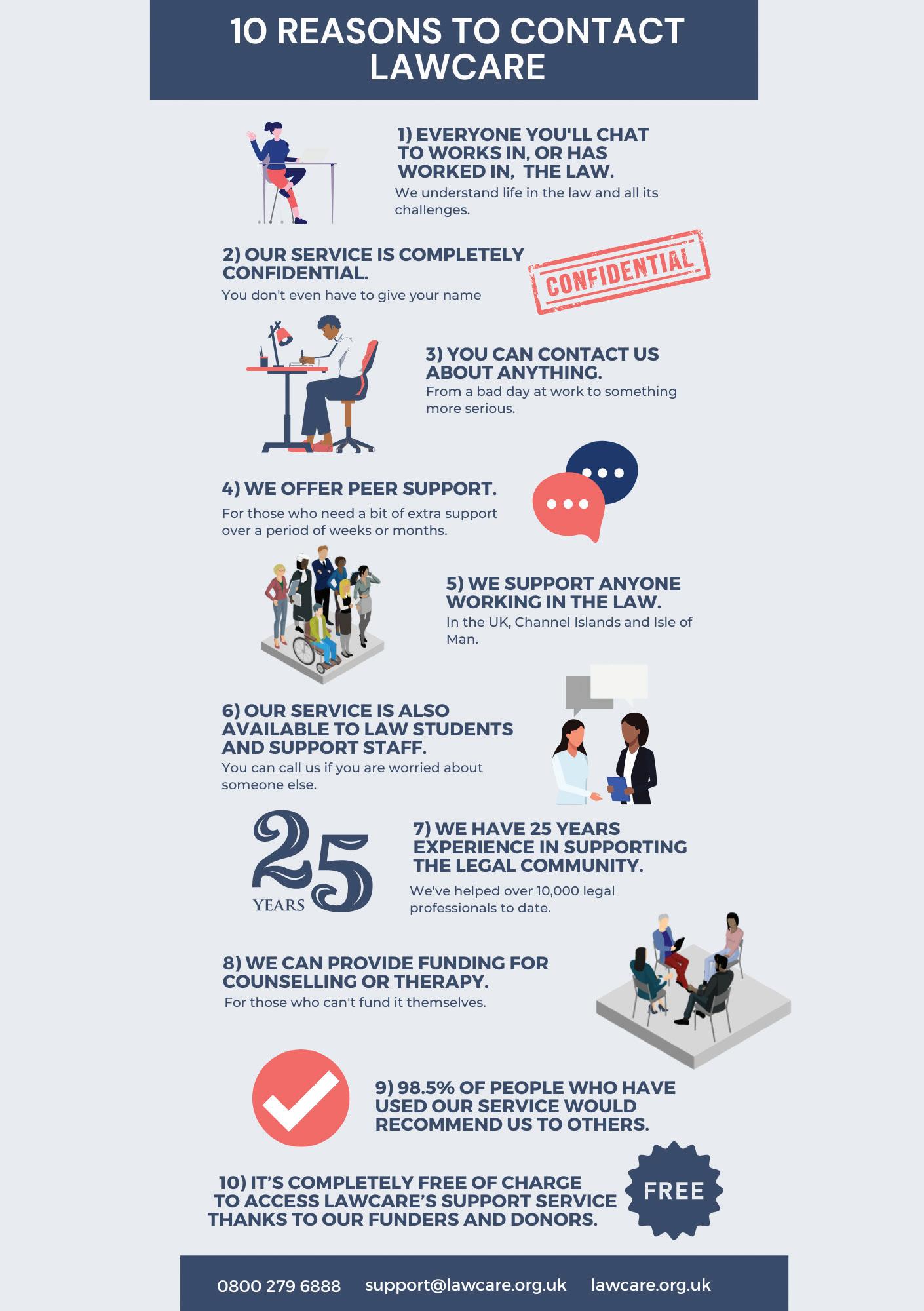
As World Mental Health Day falls on the 10th day of the 10th month here are 10 reasons why you might consider reaching out to legal mental health charity LawCare for support.
1. Everyone you’ll speak to on the phone, email or online chat either works in, or has worked in the law. We understand life in the law and all its challenges.
2. Our service is completely confidential, you
www.derbylaw.net
don’t even have to give your name.
3. You can contact us about anything at all –from a bad day at work to something more serious.
4. We offer one-to-one peer support for those who need a bit of extra support over a period of weeks or months.
5. We support anyone working in the law in the UK, Channel Islands and Isle of Man.
6. Our service is also available to law students and support staff. You can call us if you are worried about someone else.
7. We have 25 years experience in supporting the legal community and have helped over 10,000 legal professionals to date.
8. In some circumstances we are able to provide funding for single session therapy or a course of counselling with a counsellor or therapist.
9. 98.5% of people who have used our support service would recommend us to others.
10. It’s completely free of charge to access LawCare’s support service.
You can contact LawCare on 0800 279 6888, email support@lawcare.org.uk or access online chat and other resources at www. lawcare.org.uk
JoinourTellTencampaignforWorldMental HealthDayandtag10colleaguesorfriends on social or send an email or text & let them know about the free, confidential service LawCare offers everyone working in the law. You never know when someone might need us.
a knock-on effect for builders and exchange deadlines. Being able to access the BuildX platform and have searches already available and returned in moments and not weeks means these challenges are a thing of the past.
“Another key feature with BuildX is the ability to automatically alert developers once the searches have been paid for and returned, ultimately reducing the transaction process timeline for all parties involved.
With over 100 staff spread over three offices, Fidler & Pepper is a leading law firm based in Nottinghamshire and has been using Dye & Durham’s BuildX service for conveyancing solutions for new home builds.

BuildX, a Dye & Durham solution, is the result of a collaboration between developers, panels of law firms and the search company which means search data is sourced and prepared upfront. The award-winning BuildX service now supports new build conveyancing teams, reducing the average Local Authority Search time for plots from weeks, down to just a few minutes.
According to Dawn Boddice , Business Development Manager at Fidler & Pepper, BuildX has been an invaluable tool for the firm’s operations. “We started using Dye & Durham’s BuildX for searches at the start of 2021 and now use the service for the majority of our new build searches. The fact that it takes just a few minutes to access the BuildX platform, request the searches and have them returned so quickly has significantly improved our operational efficiency, simplified and streamlined our processes, and ultimately allows us to better serve our clients.
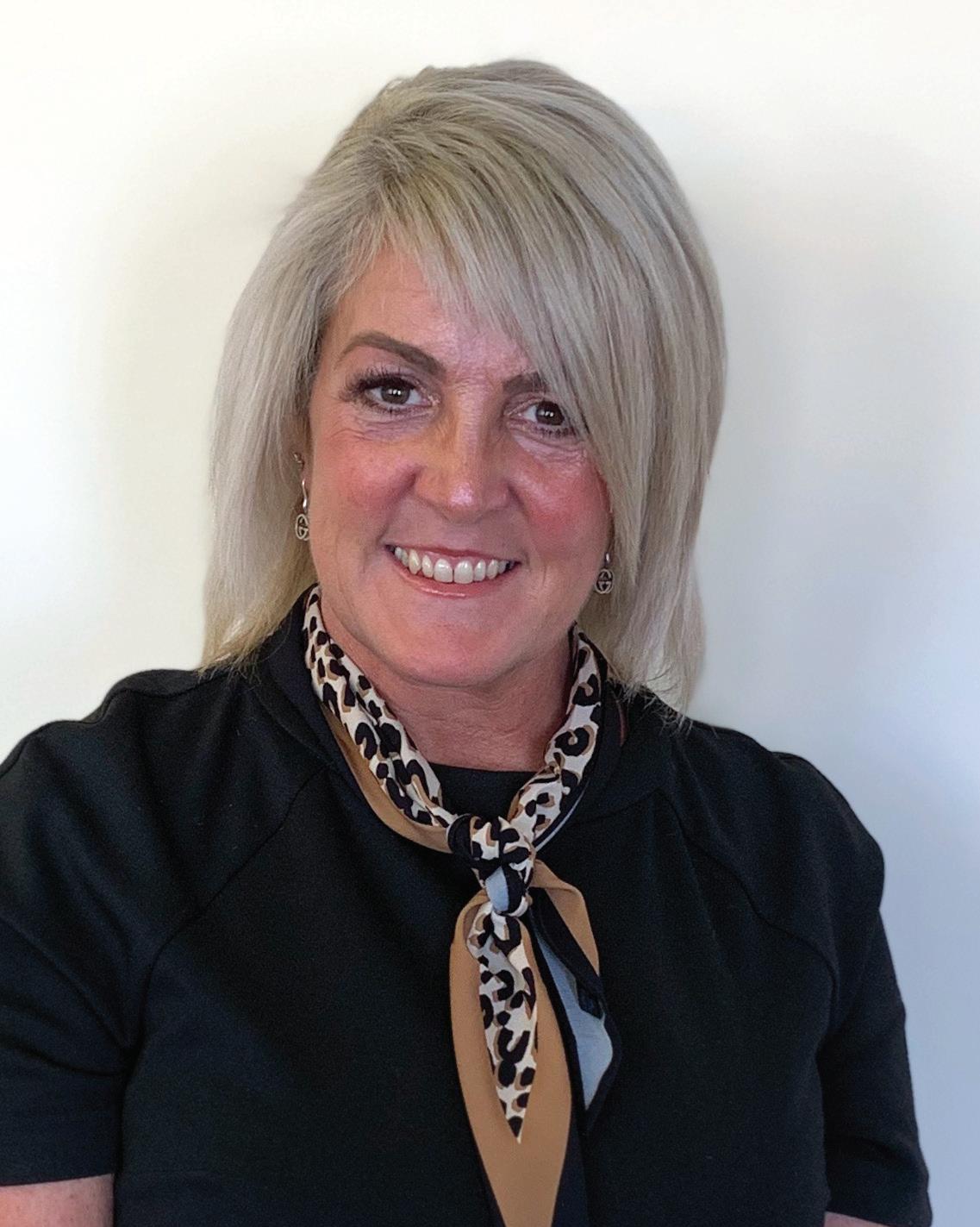
“Any conveyancing firm will know how challenging it was to get local authority searches returned during COVID-19. There was up to a nine-week delay in our area. These kinds of issues have
For the BuildX team, collaboration is key for overall success. “By working directly with the developer and our data partners, we gather, digitise and compile all of the data in real-time, allowing us to deliver property searches on new build plots almost instantly via our ordering platform,” says Amanda Giles, Business Development Manager at BuildX. “With over 300 development sites nationally and more being added every week, conveyancers and new build teams can dramatically reduce the time taken between the homebuyers’ reservation and exchange of contracts, in many cases cutting weeks off the process. Searches are backed by a £10 Million indemnity for full peace of mind.”
For further information, please email: Charlotte.Blair@ dyedurham.com
“Clients are happy, the developers are happy and so are we. It’s a win-win-win situation and we have now referred several developers to the BuildX team, so work can begin with data providers to get information ready for the searches in advance.”Dawn Boddice
with actual recovery thereafter taking decades rather than a few years. In the UK the loss of life has been predominantly in the older population although we await to see the unknown effects of long covid on the wider population. Pandemic “survivors” may well be seeking to consolidate their personal security for example by risk aversion, retention of wealth, more modest investments and frugal behaviour.
After a few years of unprecedented change, we are hopefully on the path to repairing society and a semblance of normality. So, rather than our usual in depth article on a “DNA testing” subject we thought it would be a good idea to discuss some of the causes and changes relevant to the professional services sector.
We must first offer some context by discussing firstly the effect of Covid-19 and then secondly, the war in Ukraine. The stresses caused by these events have caused heightened anxiety in the population and of course, significant changes in behaviour which are exacerbated by the use of social media channels. Tolerance and respect have taken a back seat as people seek Maslow’s “Safety and Security” and as a means of self protection, can react irrationally and poorly. Whilst there are still strong memories of the pandemic we have learnt to deal with its consequences and are growing from it. The real impediment to regaining normality is now the situation in Ukraine.
To put this into context, there have been 15 pandemics since the Black Death (13311353) and which recorded at least 100,000 deaths. The Black Death for example, wiped out over 30% of the population. The death toll due to Covid-19 in the UK has been smaller than some other pandemics, due to better public health measures and more rapid communications. The government must take some credit for their prompt action in the early days of the pandemic, when we simply did not know what kind of virus we were dealing with. Lockdown caused a precipitous drop in demand across all sectors and of course then necessitated a substantial government intervention.
In economic terms and from historical data, the effect of pandemics (in general) is to modestly reduce the natural rate of inflation,
If we can now please be excused a comment on inflation, then pandemics are in general associated with a reduction in inflation, a more restricted labour force and this in turn leads to an increase in real wages. So having weathered the three or so waves of viral infection, we might have expected to come out of it into a low inflation, cautious environment. A war is a significantly different event, unlike a pandemic, it is both the destruction of life and of capital (crops, land, building, machinery, factories) and is inherently a cause of inflationary increases. Whilst Ukraine bears the brunt of the economic damage, the inflationary effect in a global economy, reaches rapidly to other nations. It is now the Ukraine war, rather than the aftermath of the Covid-19 pandemic, that is having the most significant effect upon our well-being. It is driving inflation and it is the source of national insecurity as people again seek safety and security.
As a company we played a significant role in outbreak testing for Covid-19 and during this rather intense time, as the government focussed on mitigation and containment, the demand for professional commissioned human identity DNA testing reduced significantly. Social services and solicitors were struggling to keep case work going and home working, in terms of client contact, was simply not the answer. However, the latent demand for DNA testing has now released and significant cost pressures are with us all (e.g. cost of living wage increases, rent, utilities). Pressures on the legal aid system still exist and need attention if we are to mitigate this high inflation environment, hold down our costs and still (as a sector) provide great service to families.
There is a specific sector in family services that has been badly affected, by the war in Ukraine. Until Russia invaded, Ukraine was the centre of the surrogacy industry (estimated
25% market share) and of the countries that allow surrogacy, is the most permissive (with clear legal rules) and reasonably priced. It is estimated that before the war, around 2500 babies were born to Ukrainian surrogates per annum. Many surrogates and intended parents were trapped by the war and of course, the immediate reaction was for the Ukrainian surrogate to leave the country. Some made it, others have remained but have been moved to cities further West in Ukraine. Undoubtedly, the surrogacy clinics are struggling to function in this environment and this is compounded by desires to help the surrogate into a neighbouring country. This course of action may invalidate a surrogacy contract made under Ukrainian law where surrogates do not have parental rights over the children that they carry. Altruistic surrogacy is allowed in the UK, but the birth mother is recorded as the legal parent at birth, until a parental order is made in order to change the parentage – a DNA test is required for this and around 400 of such orders are made each year. Other countries are less permissive regarding altruistic surrogacy and it may even be banned completely. We of course continue to advise our UK clients with DNA testing in this difficult situation.
Global inflationary pressures need to be brought under control and all economies will take a while to adjust. With sensible fiscal policy, predictions of an eventual lower inflationary environment next year seem robust. Post pandemic we see UK society evolving with a renewed evaluation of human connection, family and gainful employment, there is indeed a great deal to be positive about.
Dr Neil Sullivan, BSc, MBA (DIC), LLM, PhD is General Manager of Complement Genomics Ltd (trading as Dadcheck®gold).
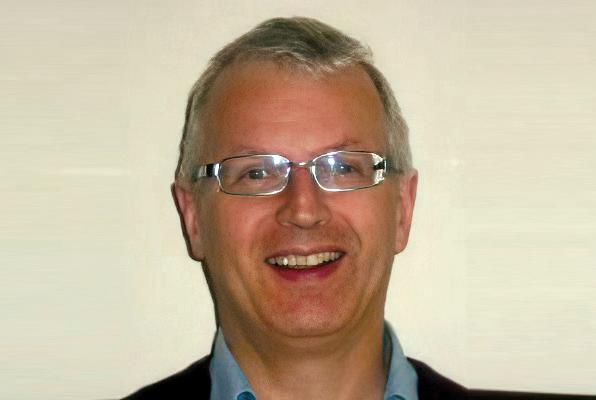
Complement Genomics Ltd (trading as Dadcheck®) is accredited by the Ministry of Justice as a body that may carry out parentage tests directed by the civil courts in England and Wales under section 20 of the Family Law Reform Act 1969.
Please see: http://www.dadcheckgold.com Tel: 0191 543 6334 e-mail: sales@dadcheckgold.com
Almost a third of young adults who have made a will did so because of the coronavirus pandemic, research by charity campaign Will Aid has found.
A poll of more than 2,500 UK adults found 31% of those in the 18-24 bracket who made a will did so because of the pandemic, the second most popular reason behind advice from a loved one.

No other age bracket recorded a number close to that, with just 8% of adults overall citing the pandemic as the motivation behind making a will.
The research was carried out by annual charity campaign Will Aid, which sees participating solicitors across the UK waive their fees for writing wills every November and instead invites clients to make an upfront donation to Will Aid.
Peter de Vena Franks, Will Aid campaign
director, said: “The pandemic showed us all the fragility of life and it is no surprise it motivated so many people to get a professionally-written will.
“While death is an inevitability people like to avoid thinking about – especially among younger adults – making a will remains no less important today as it did during the height of the pandemic.
“Having a will is the best way to guarantee your wishes are met after death, and I would implore adults of any age to consider making one.”
The most popular reason behind making a will across all age groups was having children, motivating 36% of adults nationwide to express their wishes in writing.
Those who make their will through a Will Aid solicitor are invited to make a donation of £100 to the campaign for a basic will, or
£180 for a pair of mirror wills.
The campaign has so far raised more than £22 million for charity since its launch in 1988.
Will Aid’s nine partner charities are facing increased demand for their services this year, with the cost-of-living crisis and the war in Ukraine stretching resources already limited by the pandemic.
Peter added: “Our partner charities are facing a busy and turbulent period both here in the UK and around the world as the cost-ofliving crisis continues to worsen.
“Will Aid is the perfect time to get your affairs in order while supporting our partner charities’ amazing work. We are expecting a very busy year, so book now to avoid disappointment.”
To find a participating solicitor, visit www. willaid.org.uk.
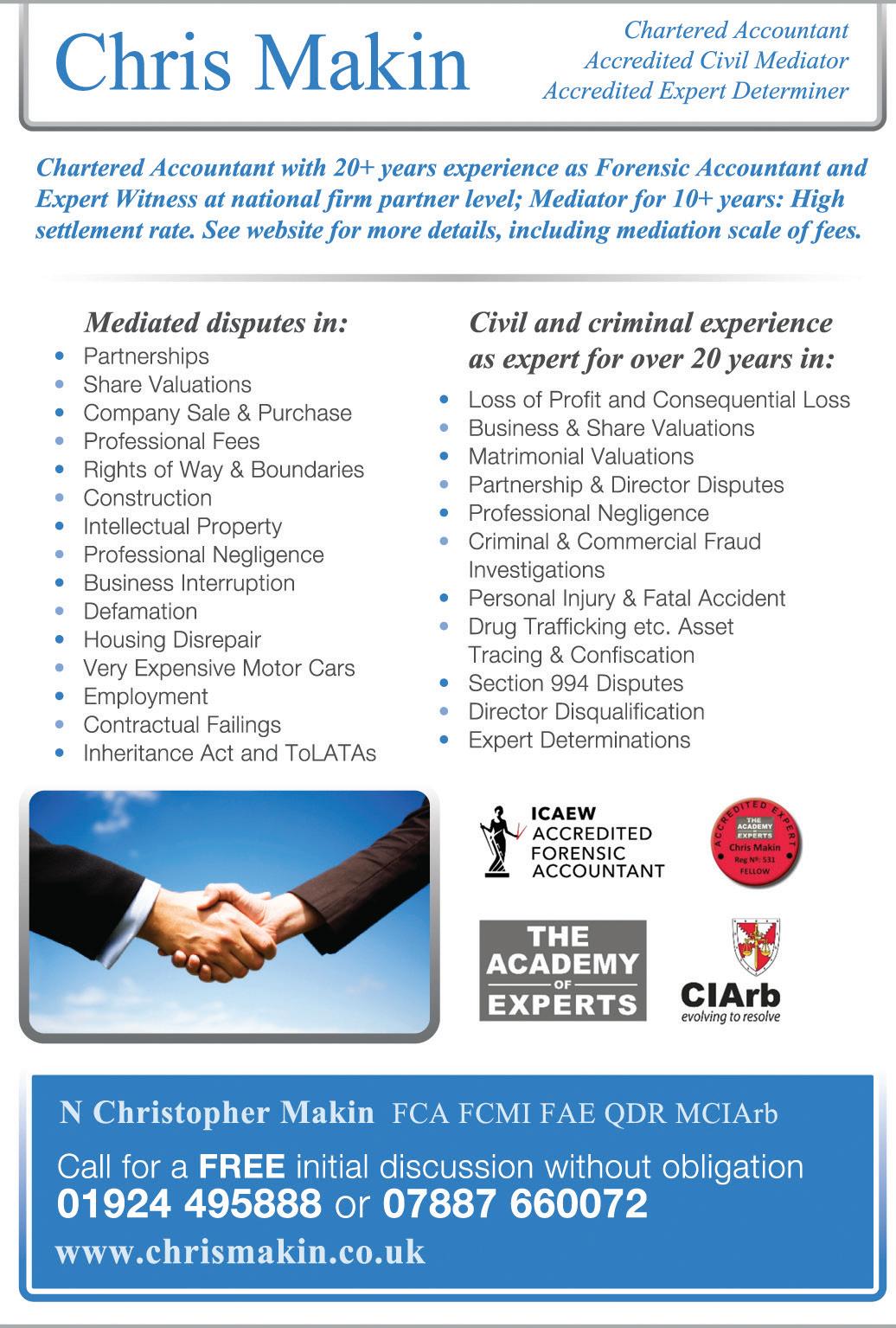
If you have read my previous articles in this publication, much of what follows will be familiar. But please read on, because I have tried to set out briefly, and after many years of bitter experience as an expert, some helpful comments and guidance for experts and those – you – who instruct them.
An expert must at all times be very aware of CPR 35.3(2) (other rules are available for criminal and family lawyers) that the expert has a duty to the court, overriding any duty to those instructing them or who are paying them. Be aware of Vernon -v- Bosley (No 1) [1996] where Thorpe LJ talked of plaintiff and defendant walking down either side of the road, but the expert must be “…ever mindful of the need to walk straight down the middle of the road and to resist the temptation to join the party from whom his instructions come on the pavement.”
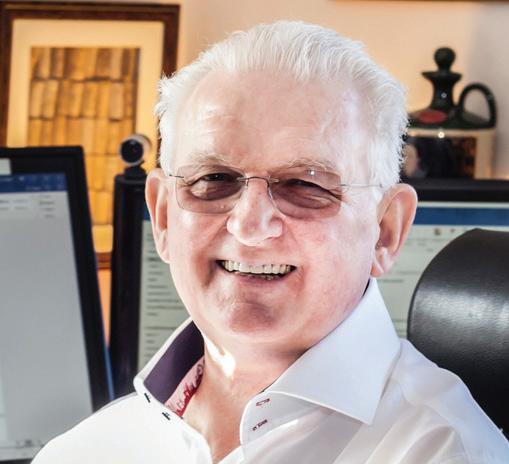
A more recent lesson comes from Mostyn J (with whom I worked when he was at the bar – it was fun) in Gallagher -v- Gallagher (No 2) (Financial Remedies) 2022 EWFC 53 where the judge took the view that the expert Singleton lacked the impartiality required of an expert witness. He acted in a “strategic defensive manner” that had “all the hallmarks of the mentality of an advocate.” His behaviour was “highly suggestive of de facto membership of the husband’s team.”
Such behaviour cannot have helped the team which Singleton thought he was playing for. Experts can be polite and helpful, but don’t expect them to be bestie friends.
I can comment on this as both expert and as mediator.
If an expert does attend a mediation, they must walk a very fine line. The atmosphere in a mediation is very different from the courtroom. At mediation, everyone is friendly (usually) on first name terms (usually) and willing to reach compromises (occasionally!). What part should an expert play in this? In my view, no part at all. If there were complex matters within the experts’ expertise, they should have hammered those out beforehand and produced a joint statement, however informal.
Where I see a pair of experts at my mediations, I ask them to hold a joint meeting in a side room – they should have done this beforehand – and keep them out of the way. Mediation is “big picture” and broad brush; detailed figurework just wastes time and should have been done beforehand.
And if the expert does participate in the discussions, it is difficult for him/her to appear impartial, to demonstrate from the witness box that overriding duty to the court, if the mediation should fail and formal litigation ensue.
Anything said and heard at mediation is confidential, of course, but it is particularly unhelpful if an expert were to say one thing at
mediation and something quite different at trial. It is safer to keep your experts away; perhaps available for telephone help, but not participating in the discussions.
As with most stages of litigation where experts are involved, there is no substitute for engaging an expert who, as well as being outstanding in their profession, has taken the trouble to learn how to be a member of the second profession - of expert. The Academy of Experts and the Expert Witness Institute teach this second profession very well.
This is particularly important with meetings of experts. Instructing solicitors and even judges can have a hand in preparing the agenda for such a meeting, but in my experience after many hundreds of these meetings, they never do. And why should they? The opposing experts have produced their reports, the differences are obvious, and there’s your agenda.
And never, ever, interfere in the drafting of the joint statement. This must be the work of the experts; it becomes part of their evidence in chief.
There is a strident example of how this can go wrong in Patricia Andrews & Ors -v- Kronospan Ltd [2022] EWHC 479 which I discuss
at length in my blog at https://chrismakin.co.uk/expert-meetingleave-well-alone/. It’s a good read, but in essence one expert worked closely with instructing solicitor for two years beyond the date for filing of the joint statement, charged £225,000 (far more than I have ever charged!) and had their evidence excluded. The client would have been left without expert, except that the trial date had not been fixed and the judge found that a new expert could start again, and the waste of time could be reflected in costs. What a waste!
Finally to privilege. Be very careful what you disclose regarding instruction of experts.

In Pickett -v- Balkind [2022] EWHC 2226 (TTC) a letter from an expert was presented to the court by the claimant’s lawyers to support an adjournment of the trial because of the expert’s ill health. Unhelpfully, the first four paragraphs of that letter raised questions regarding that expert’s independence. The claimant’s lawyers asked for those four paragraphs to be regarded as privileged. The judge refused the application, and ordered that the expert should be cross-examined at trial. That would not have been comfortable for him, and would probably have not helped the claimant.
Litigation is complicated enough for lawyers, but when choosing your experts, recognise that their job is complicated, too, so don’t choose an enthusiastic amateur. And better yet (as the Americans would say) choose the expert yourself with care; don’t leave it to the office junior (it happens!)
Biog: Chris Makin has practised as a forensic accountant and expert witness for 30 years, latterly as Head of Litigation Support at a national firm. He has given expert evidence about 100 times. He also performs expert determinations.
Chris is a fellow of the Institute of Chartered Accountants where he has served on the Forensic Committee, and as an ethical counsellor; he is a fellow of the Chartered Management Institute, a fellow of the Academy of Experts where he serves on the Investigations Committee, and a mediator accredited by the Chartered Arbitrators.
He practises as a mediator, from his home in West Yorkshire and his rooms at 3 Gray’s Inn Square, London WC1R 5AH, telephone 020 7430 0333. He has mediated 100+ cases so far, on a huge range of subjects, with a settlement rate to date of 80%. For more see his website with videos:
Finders International is a professional probate genealogy company, established in 1997 by Managing Director Danny Curran and is now one of the world’s largest firms in our field. We are best known for tracing missing heirs and identifying lawful and entitled next of kin, having worked extensively with lawyers, probate practitioners, banks, deputyship teams, trust companies and state trustees.

Finders have offices in London, Edinburgh, Dublin and Sydney and over 150 personnel, enabling us to complete searches quickly across multiple jurisdictions. When complex estates need to be dealt with, we have a proven track record of tracing beneficiaries globally.
We support the legal profession and know our research forms part of a serious legal process that reflects on your firm. Therefore, we will work efficiently and in the best interests of your company, the personal representatives, and beneficiaries at all times.
We are aware of the need to support the services of sole practitioners when dealing with Estate administration matters. In addition to tracing missing heirs or Executors, we can assist with a range of legal support services; searching for missing Estate assets, obtaining missing documents, carrying out overseas bankruptcy searches, and conducting thorough insurance-backed Missing Will Searches, as well as a range of probate property solutions, and offering insurances to enable safe distribution of funds.
We are here to provide consultative and practical support to practitioners and estate administrators with the liquidation, disposal and return of a variety of assets located overseas.
We have a range of International Asset Services to assist with complex multijurisdictional estate matters, offering Medallion Signature Guarantees, the sale and transfer of overseas stock, closure of overseas bank accounts and obtaining overseas Grants of Probate. These
specialist services are designed to assist sole practitioners with overseas estate elements they may not encounter on a regular basis.
UK Estates are much more likely to contain at least one overseas asset these days. From a bank account opened in Australia for work, to a holiday home purchased while on holiday in Spain, to tax planning investment accounts opened in the USA and offshore in places like the Isle of Man and Jersey, to accounts in Ireland or beyond, to shares that, due to corporate action, have ended up listed in all sorts of places worldwide – it’s quite possible that an estate may feature one or more of these scenarios. What unites them is that they’re often surprisingly time-consuming and challenging to deal with – whether that involves closing an account, liquidating a portfolio or selling an individual shareholding. Numerous legal and bureaucratic obstacles spring up which must be navigated before the value can be restored to the estate in the UK. The sheer variety of scenarios is something that an estate practitioner may not have encountered often, or at all. Another scenario is that you may be pressed for time and anxious to progress multiple aspects of the estate administration at once. That is where Finders’ International Asset Service comes in.
We apply a practical, problem-solving approach to a range of asset services, helping to sell, transfer or recover a range of overseas assets including shares, bank accounts, and investment portfolios, assisting estates with the necessary administrative and legal paperwork. With a combination of specialist knowledge, contacts, and experience, Finders will get the job done.
Our Credentials – A tried and trusted firm
Reputation is critical in the probate world, and we will safeguard yours as closely as our own.
We are founder members of the International Association of Professional Probate Researchers www.iappr.org, which provides regulation, a Code of Conduct and a complaints procedure for a network of elite international companies. The IAPPR is one of many respected and recognised organisations we have chosen to belong to,
or qualified as members of, to complete an impressive list of accreditations. In an unregulated industry, Finders International is a name to trust.
For 4 years running, we have been awarded ‘Best UK Probate Research Firm’ at the UK Probate Research Awards and won the same award at the 2020 British Wills and Probate Awards.
Our Managing Director, Danny Curran, is known as the industry spokesman with over 100 media contributions. From Forbes Magazine, The Times, and all the UK nationals, to appearances on ITV’s This Morning and numerous Radio interviews, positively promoting the probate research profession.
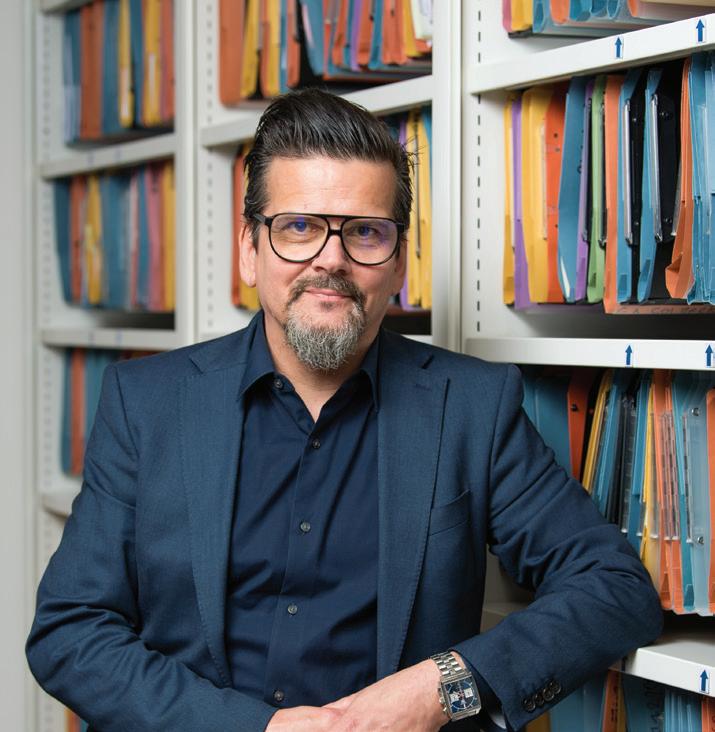
We also complete hundreds of pro-bono cases every year, helping with stories of reunions of family separated by war or forced adoption and reuniting people with family heirlooms such as their ancestors lost war medals or long-lost books.
For free advice or a no obligation quote, contact us today:
+44 (0)20 7490 4935
quotes@findersinternational.co.uk
www.findersinternational.co.uk

